FARMERS CLUB
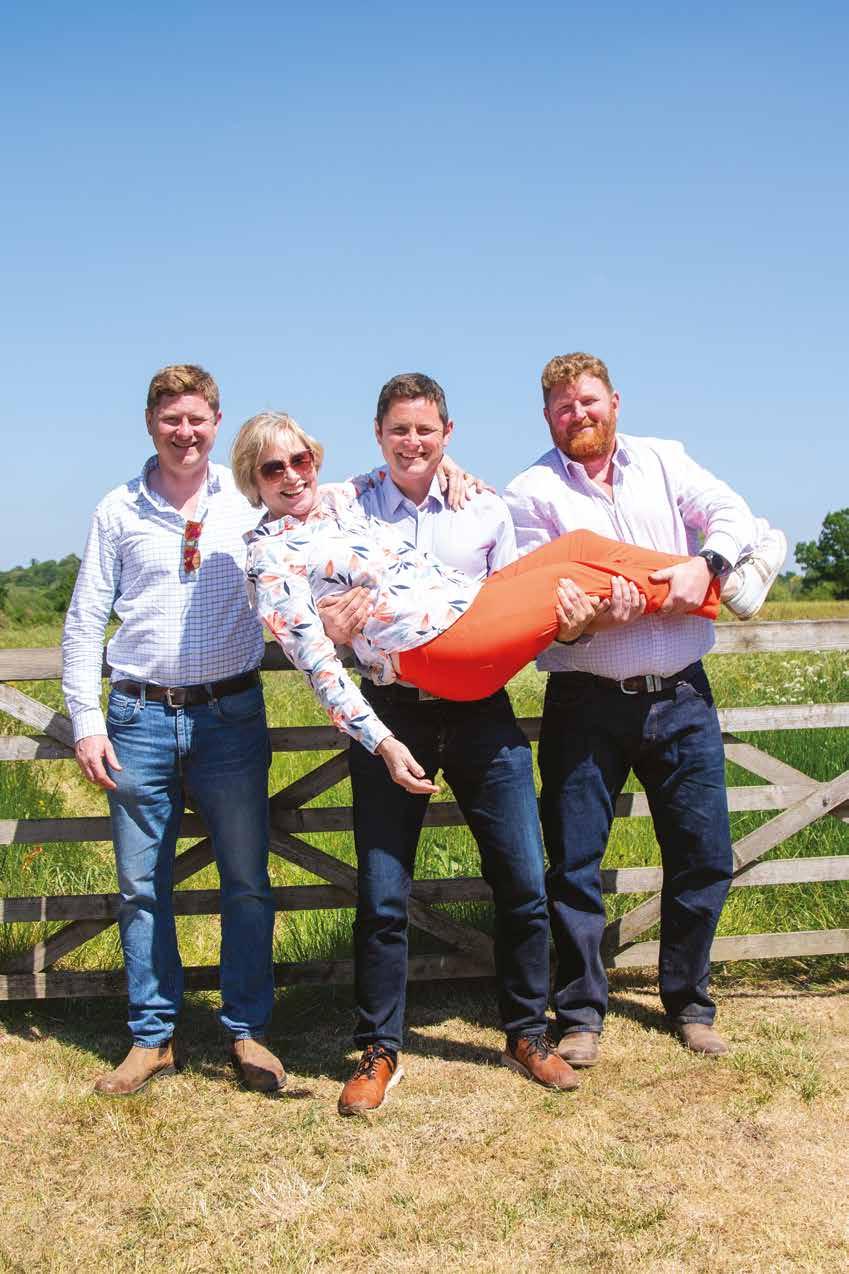


Family farming in Staffordshire – home county of Club Chairman Karen Mercer
GRAIN TO GLASS
U35s members impress with award-winning gin diversification
MONDAY LECTURE
George Dunn on the need for better landlord and tenant relationships
TOWN & COUNTRY
Latest bumper crop of Club events for members and their guests

Serving the farming industry for over 180 years
3 Whitehall Court, London SW1A 2EL
T: +44 (0)20 7930 3557 E: generaloffice@thefarmersclub.com W: www.thefarmersclub.com
Chairman 2025: Karen Mercer
Chief Executive & Club Secretary: Didi Wheeler
Reception
020 7930 3557 ext. 200 & 201 or option 2 reception@thefarmersclub.com
Restaurant Reservations
020 7930 3557 option 3 restaurant@thefarmersclub.com
Bedroom Reservations
020 7930 3557 ext. 204 or option 4 reservations@thefarmersclub.com
Conference & Banqueting
020 7925 7100 functions@thefarmersclub.com
Membership 020 7925 7094 membership@thefarmersclub.com
Member Experience
020 7930 3751 memexpmanager@thefarmersclub.com
Club Events
020 7930 3751 memexpcoordinator@thefarmersclub.com
Finance
020 7930 3557 ext. 221 or option 8 financialcontroller@thefarmersclub.com
General Office
020 7930 3751 generaloffice@thefarmersclub.com
Instagram: @the_farmers_club
Facebook: The Farmers Club Page X/Twitter: @TheFarmersCub
The Farmers Club Journal
Designed, produced and published by Fenelon Publishing Limited on behalf of The Farmers Club
Cover photo by Ruth Downing
Disclaimer: Articles published in The Farmers Club Journal do not necessarily reflect the views of The Farmers Club. No responsibility for the quality of goods or services advertised in the Journal can be accepted by the publisher. Advertisements are included in good faith. All rights reserved.
4 Chair’s Comments
Karen Mercer welcomes members to the UK's agricultural shows
6 St George's Day
Shadow Defra farm minister Robbie Moore gives passionate speech
8 Club Diary
Our summer season calendar of Club outings and activities
11 Weather Prophets
How meteorologists are helping farmers combat climate change
14 Monday Lecture
George Dunn on the need for good landlord tenant relationships
19 Pinnacle Awards
Top accolade for business advice
19 Ladies in Agriculture
Inaugural dinner is huge success
21 Tour of Staffordshire
Club Chairman Karen Mercer showcases her home county
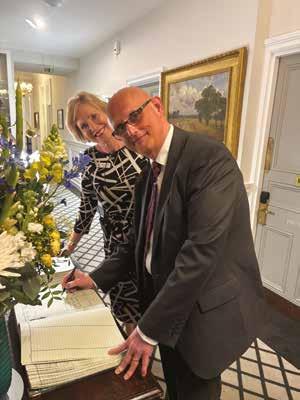
30 Food & Drink
Introducing Ben Nicholas – our new food and beverage manager
31 Steak Festivals
A wonderful journey comes to an end for head chef Paul Hogan
50 Farmers Club Cup
Baroness Minette Batters DL REGULARS
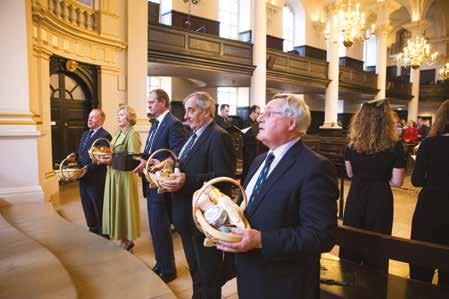
Town & Country
Club events for the months ahead
Charitable Trust
How to apply for a trust grant
Golf Society
Packed fixture list for 2025
Chairman’s Jottings and Dinner
Club Information
Membership and staff news
CHAIRMAN’S COMMENTS
Karen Mercer
Harvest will soon be upon us here in Staffordshire.
To date, we have had very little rain, only promises of more to come. I know many of you have fine-tuned your own rain dances which I hope are successful and you all have a good harvest.
It has been a busy three months. It was my great pleasure to welcome Defra shadow farm minister Robbie Moore MP to be guest speaker at our St George’s Day lunch – during which I presented the Farmers Club Cup to Baroness Batters, who we all know simply as Minette.
The following week we had our Monday Evening Lecture – expertly delivered by George Dunn, chief executive of the Tenant Farmers Association. Both events were thoroughly enjoyable, thoughtprovoking and well-attended by Club members (see pages 6-7, 14-18 and 50)
Warm welcome
The summer show season is in full flow. When I attended the Royal Balmoral Show last year on behalf of the 2024 Club chairman Richard Maunder, I made a promise to return and spend more time in Northern Ireland.
This I have now done and I was not disappointed. The overnight ferry docked early Saturday morning and I received an incredibly warm welcome from everyone I met during my five days in what is a beautiful part of the UK.
The sun shone and the scenery was stunning as we travelled the Wild Atlantic Coast Road and then the Giant Causeway Route. Three big pluses: little traffic, no litter and an absence of potholes. What an absolute pleasure. I will certainly return again.
The Farmers Club dinner on the eve of the Balmoral Show was at Queens University Belfast – a very prestigious venue where we welcomed 65 guests and Northern Irish farm minister Andrew Muir MLA. Thank you, Professor Nigel Scollen, for welcoming us and all those who made the evening such a success.
The Balmoral Show is Northern Ireland’s biggest agricultural event, a force for good and a showcase for all that is great in farming. I didn’t miss a corner, met many people and learned a great deal.
Farmers Club committee member John Henning is President of the Royal Ulster Agricultural Society, and we were generously entertained as his lunch guests. Thank you, John, for your hospitality.
It was then on to the great Staffordshire County Show – in my home county – which goes from strength to strength. This year had a spectacular showing of cattle and the grand parade was a feast for the eyes. I spoke at the NFU reception attended by more than 200 people. It was a great opportunity to tell the Farmers Club story.
There are more shows to come – and I look forward to representing the Farmers Club at all of them – in the north, south, east and west of the UK.
I thoroughly enjoy watching the stock judging, so I should certainly have got my eye in by the end of the season.
My Chairman's Tour of Staffordshire was a huge success. The sun shone and together we created some wonderful memories (see pages 20-24).

“I received an incredibly warm welcome”
I would personally like to thank all those who made the Staffordshire tour possible: James and Rupert Major, of Castle Hayes Park; Roger, Tom, Robert and Alec, of Mercer Farming; and JCB.
Our guest speakers were John Everitt of the National Forest and Simon Clarke – our own Staffordshire man. Reverend John Allan took the lovely thanksgiving service at my local church. We even had a surprise show from the Abbots Bromley Horn Dancers to entertain everyone at my home on the Tuesday evening.
Our season of farm visits continues, following
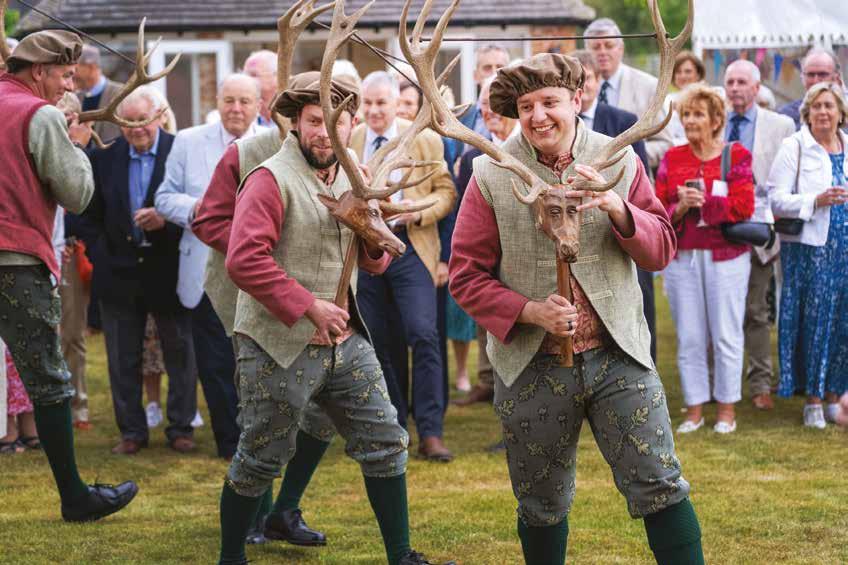
a successful and very popular visit to James Peck, of PX Farms, at Dry Drayton in Cambridgeshire. It is a most impressive arable business encompassing some 5,000ha across four counties.
We were also treated to a private tour of the 2,400ha Wiston Estate in West Sussex. In the Goring family since 1743, the estate includes a south-facing vineyard planted with Pinot Noir, Pinot Meunier and Chardonnay vines – producing wines which rival some of the best in France.
Looking forward
This summer, we will also be travelling to Chepstow to visit Lyndon Edwards and his organic dairy farm – an enterprising and busy family business focusing on highquality and efficient milk production.

With his son Tom, Lyndon milks 250 prize-winning pedigree cows and keeps 100 crossbred Angus and Hereford cattle. His daughter Harriet runs the farm shop, café, delicatessen and butchery.
Later in the year, we will visit Ali Capper’s apple and hops farm on the Herefordshire-Worcestershire border. This will be followed by a visit to the Harper Adams University farm in Shropshire.
Above: The Abbots Bromley Horn Dancers were a highlight of our three-day Staffordshire Tour
Left: Karen Mercer presents Northern Irish farm minister Andrew Muir MLA with a pair of Farmers' Club tumblers
Below: Edinburgh Castle resplendent on a summer's evening ahead of this year's Royal Highland Show

Our AGM is on Tuesday 15 July when our guest speaker will be Anna Taylor, executive director of the Food Foundation – an organisation on a mission to enable healthier and more sustainable eating habits by engaging policymakers and businesses to improve our food system.
Anna has some strong thoughts and ideas about the intersection of public health, sustainable agriculture and food policy. She is well worth listening to and your attendance would be welcomed.
May I take this opportunity to wish you all a good summer and harvest. I look forward to catching up with as many of you as possible in the coming months.
Our annual lunch in honour of England’s patron
saint is as popular as ever
Shadow Defra farm minister
Robbie Moore MP received a warm welcome as guest speaker at the Club’s annual St George’s Day lunch this year.
More than 85 members and guests came together to celebrate the patron saint of England on Wednesday, 23 April – including a strong cohort who had managed to escape for the day from Yorkshire.
Formal guests including Richard Crane, Master of the Worshipful Company of Farmers – with PastMasters Rosie Carne and David Bolton also in attendance; Baroness Minette Batters DL; and the Reverend John Allen.
Christian faith
A lively throng gathered for prelunch drinks, with Club Chairman Karen Mercer noting a lack of “Georgina’s” as men outnumbered women. “Perhaps next year we may see a change?” she suggested.
A man who never visited England, St George was born in 3rd century in Cappadocia, part of modern-day Turkey. Reputedly a soldier in the Roman army, he was executed for refusing to renounce his Christian faith in favour of the pagan gods.
Canonised by Pope Gelasius I in 494AD, St George was chosen by King Edward III as England’s patron saint in

1348. The red cross of St George on a white background is well-known as England’s national flag; but there is a further royal connection of which many people are unaware.
In 1940, King George VI created the George Cross – a new award for acts of extreme heroism or courage in circumstances
Above: Diners raise a glass to St George
of utmost danger. Named after the monarch, the medal depicts St George vanquishing the dragon.
At Karen's behest, diners raised their glasses to toast St George.
“May you find the strength to face your battles, the courage to stand tall, and the faith to overcome any obstacles in your path,” said Karen.

Afarmer’s son from Lincolnshire, guest speaker and shadow Defra minister
Robbie Moore started his career as a rural chartered surveyor, later becoming a fellow of the Central Association of Agricultural Valuers. Elected as a Northumberland county councillor in 2017, Mr Moore unsuccessfully contested the July 2019 by-election for
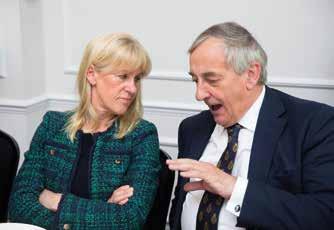

St George is internationally recognised as a symbol of bravery and a beacon of shining hope in the face of adversity – making this the perfect day of to present The Farmers Club Cup, awarded annually to an individual who has made a long lasting and significant contribution to UK agriculture.
Northumbria Police and Crime Commissioner. In the December general election that same year, he was eleccted as Conservative MP for Ilkley and Keithley by 2,200 votes
Mr Moore served as a junior Defra minister in Rishi Sunak’s government before retaining his seat in the 2024 election. He is now in opposition as a shadow minister.
Speaking passionately at the St George’s Day lunch, Mr Moore acknowledged that the Conservative government had made mistakes. He said he believed in positive change and being judged on his actions.

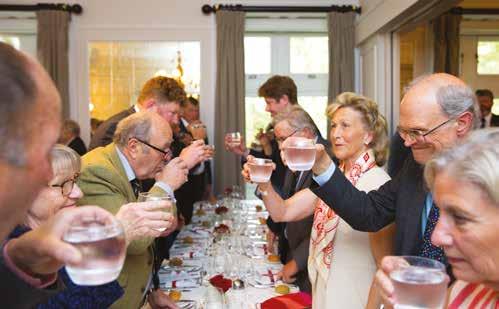
Guests included former NFU presidents Minette Batters and Meurig Raymond (top left)
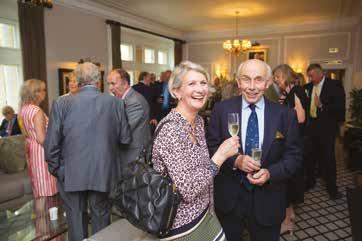
A hush descended on the room as the 2025 recipient was announced: former NFU president Baroness Batters – better known to many of us as Minette. The rapturous applause and cheering that ensued from those present clearly indicated the popularity of this decision (see page 50)
Clearly prepared to lead from the front, Mr Moore said he was up for the battle with the Labour party and Reform UK at the next general election – and was not afraid to duck some direct questions from members in the audience.
Unsurprisingly vocal on the need to overturn the government’s decision to impose inheritance tax on farm assets worth more than £1 million, Mr Moore highlighted the importance of food security.
A Conservative governmnent would deliver a fairer outcome for farmers, he promised listeners.
Our sumptuous dinner included asparagus and air-dried York ham, single muscle beef rump with seasonal trimmings, and a delightful Madagascan vanilla and white chocolate tart with raspberry sauce.
Once again, we were spoilt rotten by Farmers Club head chef Paul Hogben and the Kitchen Brigade.
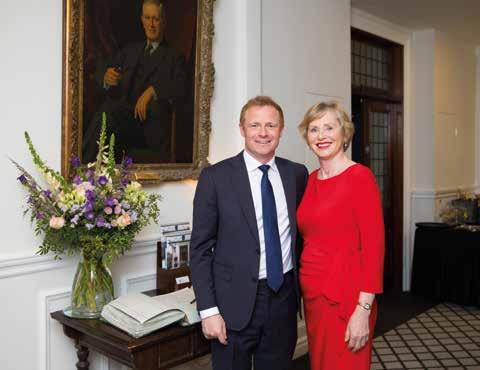

ISummer is here and the Club is in full swing with a packed programme of events for members, says Club Secretary and Chief Executive Didi Wheeler
write these notes as I return from the Royal Highland Show – yet another blisteringly sunny yet wonderful summer event. Not a drop of rain in sight, and there has been precious little for many months.
Flying back from Edinburgh over the Scottish and English fields far below, it was stark to see the impact lack of rain is having on the countryside. On top of everything else in farming at the moment, this is one of the most pressing
I’m delighted to report the Club is in good health despite the challenge of having one foot in agriculture and one foot in hospitality. One could say this is a perfect storm, but we are weathering it well.
Summer season
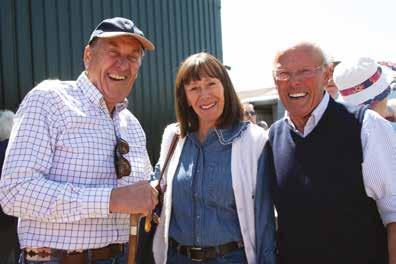
position the Club within the wider agricultural community.
This is something I’m passionate about. If you think you can help us achieve this goal, do email or let me know when you visit the Club.

Above: all smiles on the Tour of Staffordshire
The summer season is in full swing with Royal Ascot, Henley Royal Regatta, cricket at Lords and tennis at Queens and now Wimbledon creating a splash of vibrant colour as guests flock to the Club.
We are running more events this year than ever before. This Journal covers many of the activities – both here at the Club and on outreach, bringing the ‘Club to Country’.
The summer season of farm visits and agricultural shows enables the Chairman and myself to meet members in their counties. It also provides a wonderful opportunity to raise the profile and better
The Club has so much to offer existing and prospective members, whether for business or pleasure, for family or personal use, weekend or midweek. If you know someone interested in joining, please tell us.
We stand today at just over 5000 members and are taking active steps to grow our numbers, to ensure a healthy foundation for the Club. I can confirm that there is no waiting list to join.
Concerning your Club team, we recently said farewell to Jelle van Esseveld, who has been with us for over 10 years. Next month, and after 11 years of service, head chef Paul
Above right: relaxing at Royal Ascot
Abusy three months at the Club kicked off with a St George’s Day lunch in honour of England's patron saint. Our Guest speaker was Shadow Defra farm minister Robbie Moore MP (see pages 6-7); and Chairman Karen Mercer presented Baroness Minette Batters with The Farmers Club Cup (see page 50).
We are running more events than ever”
Landlords and tenants
George Dunn, chief executive of the Tenants Farming Association, spoke on the need for better landlordtenant relationships at our Monday Evening Lecture (see page 14-18). The Past Chairmen’s Lunch saw many old friends reconvene gather at the Club, congratulating and

welcoming Sarah Cowlrick, who has been nominated to be our Vice Chairman for 2026.
A fantastic Chairman’s Legal Day in London saw members gather for tours of the Royal Courts of Justice, Temple Church, Middle Temple and the Old Bailey – before returning to the Club for a three-course dinner.
The final of the Club's Pinnacle Awards saw stiff competition from eight agricultural students this year. Our guest speaker on the day was Clare Taylor, farmer, and founder of Agvocacy Consulting.
Our Pre-Balmoral Show Club
Dinner at Queens University Belfast was kindly enabled by Club member Professor Nigel Scollen. We were extremely well looked after, and QUB is likely to become a regular
Hogben is retiring (see page 32) We wish both all the very best. These departures, along with the arrivals of Roland Haimer, as general manager; and Ben Nicholas, as food and beverage manager, mark another important leg in the journey of the Club. While we are inevitably saddened when old friends depart, new arrivals bring new ideas and opportunities that reinforce the best of what we do and offer us the opportunity to make improvements too. With that in mind, we are pleased to say that our new head chef starts in late August.
Teresa's contributions are too numerous to mention but declaring war on French apples in the 70s; and co-founding the Women's Farming Union, are among the mnost memorable.

I was delighted to see Teresa Wickham (pictured, above right), was honoured with the Lifetime Achievement award at the National Women in Agriculture Awards in May. Teresa has had an astonishing career in food and farming; she is a tour de force that has earned her the nickname the Kent Crusader.
venue for us as we strengthen ties between institutions.
The Chairman’s three-day Tour of Staffordshire was equally successful – attracting more than 60 members to Karen Mercer's home county (see pages 20-24)
Karen also attended her local Staffordshire County Show, speaking at an NFU reception. Meanwhile, Vice Chairman Chris Riddle and myself were at the Suffolk Show, for a breakfast reception with the Country Land and Business Association.
We were joined by Suffolk Agricultural Association president Robert Rous DL and chairman Bill Baker, and were fortunate to secure Archie Ruggles-Brise and Richard Negus to speak about biodiversity and creating wildlife habitats.
continued on page 10
I am bowled over by the talent of the Next Generation entering agriculture. Please read our update on the Club Pinnacle Awards (see page 19)
Lastly, I would like to highlight an extraordinary challenge being undertaken in September by sibling members Hugh and Alex Addison to raise £10,000 for RABI to assist in mental health support within rural communities.
Hugh and Alex plan to cycle, swim and run the breadth of Ireland and Great Britain over four days – cycling over 400km, swimming the Irish Sea and then running the length of Hadrian's Wall. Please support them if you can by visiting www.theborderlinechallenge.co.uk.

continued from page 9
Early June saw members welcomed by Richard and Kirsty Goring to the vineyard and historic Wiston Estate in West Sussex. After an introduction to the estate, members toured the fermentation and bottling facilities of Wiston's renowned sparkling English wines.
Richard's deep connection with the land and his team's expertise were evident as he highlighted the meticulous processes that have contributed to the estate's awardwinning wines.
Members also embarked on a scenic journey across the estate's 6,000 acres of diverse landscapes, including vineyards, arable fields, and grazing pastures. Mark Ansell, the estate’s conservation and stewardship manager for more than 30 years, shared reflections on how the land has changed and been cared for over time. The vines now stretch across a beautiful, south-


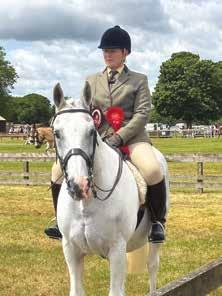









Above: crowds flock to the Cereals event
Left: a young entrant at the Suffolk Show
facing slope of the South Downs – land once used by the Romans for growing grapes over 2,000 years ago. If you haven’t been, it’s an absolute must.
The Chairman and I ventured to Lincolnshire for the Cereals event, hosted by member Andrew Ward. It was an opportunity to learn more about arable farming, see cutting edge innovation and listen to those at the top of the sector. Literally a blister day standing in the fields.
Royal Ascot week started in style with a Club dinner before a day at the races. Our guest speakers were member Guy Henderson, a former chief executive of Ascot Racecourse; and Vanessa Ryle, the Horse Racing presenter, reporter and producer..
I counted ten historical snippets, six key statistics, three close shaves and four Royal anecdotes from Guy; accompanied by a bevy of top tips for punters from Vanessa.
Our Pre Royal Highland Agricultural Show Club Dinner at the New Club was once again a belter, attended by 73 members to hear outstanding guest speaker Grierson Dunlop. The Royal Highland is one of the best, with the cattle classes in particular hard to beat anywhere else.
Our Chairman's second farm visit was to James Peck at PX Farms, Cambridgeshire. In recent weeks, members and their guests have also enjoyed the Henley Royal Regatta; and a joint reception with the Worshipful Company of Farmers, RASE and CARAS at the Royal Norfolk Show.
In addition, more than 40 members enjoyed our reception at the Kent County Show with guest speaker – a fifth-generation owner of Kent-based Hugh Lowe Farms and supplier of strawberries to the Wimbledon Tennis Championships for over 25 years.
Looking ahead, our imminent visit to the Great Yorkshire Show includes a joint reception with Strutt and Parker, with grateful thanks to member David Slack.
Finally, I would like to highlight our combined visit on 10 November to the Houses of Parliament, hosted by Baroness Minette Batters and Robbie Moore MP; and our visit to Coutts Bank, 440 The Strand, hosted by the bank's commercial director Phillipa Bagshaw.
For all future events, see Town & Country, which starts on page 34.
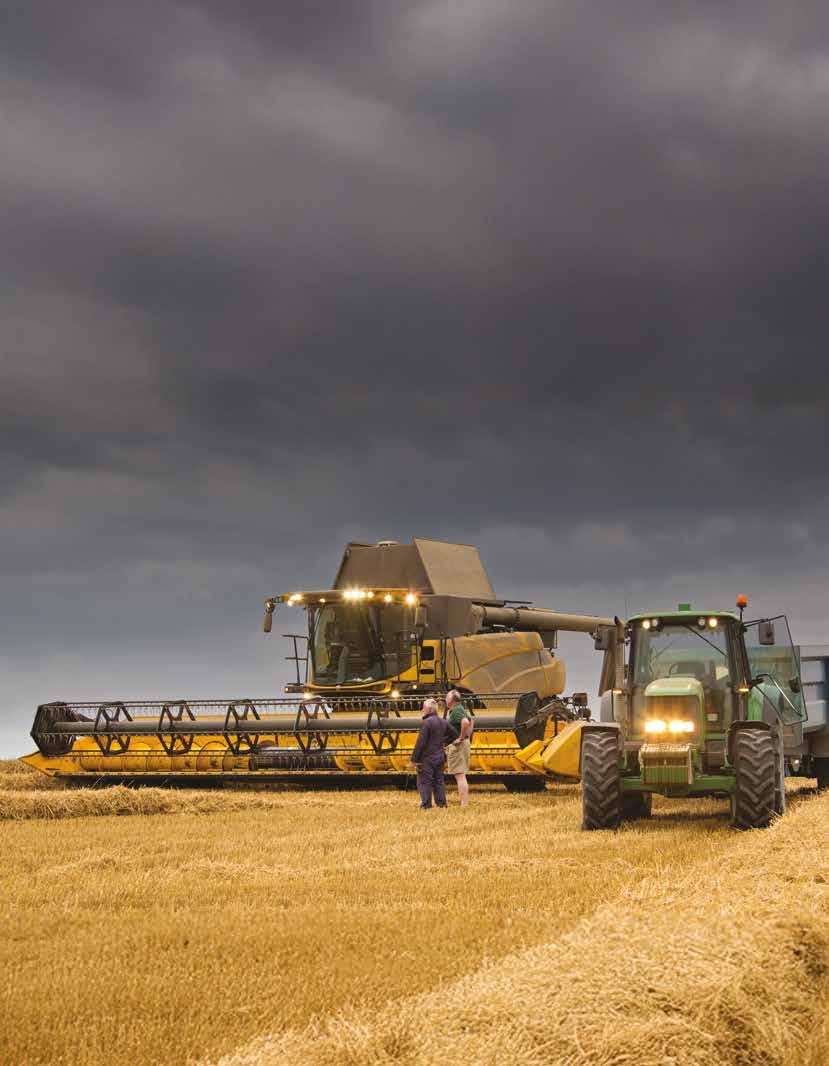
How forecasters are helping farmers make sense of Britain’s topsy-turvy climate >>

Uncertain weather, volatile markets and the need to plan months ahead mean long-range forecasts are increasingly important for UK farmers.
More growers and livestock producers are finding it vital to look well beyond the traditional five-day forecast – and meteorologists are responding by refining their seasonal and long-range forecasts for better decision-making on farms.
From climate to crop management
Long-range forecasting has always been challenging. But recent developments in climate modelling, data assimilation and computing power are making it easier – particularly over weeks and months.
Earlier this year, the Met Office transferred its operational weather and climate intelligence to a huge new supercomputer. Better forecasts over longer time periods will be a major advantage, says chief information officer Charles Ewen.

“One big thing this new computer will allow us to do in the near future is to be able to produce 14-day forecasts with a similar kind of accuracy than we can today for seven, eight or nine days.”
Beyond that, Met Office researchers and meteorologists are hungry for even more computing power – enabling them to run more complex weather models.
Long-range forecasts typically extend from two weeks up to three months. “Essentially there’s more science than we have the compute power to deliver, so it’s not a question of how much compute do you need, it’s how much you can get.”
Unlike short-term forecasts based on immediate atmospheric conditions, these rely on the behaviour of larger climate drivers like the El Niño Southern Oscillation (ENSO), North Atlantic Oscillation (NAO), and jet stream patterns.
Ségolène Berthou leads a team of researchers working on the agency’s environmental prediction
Photos (clockwise from top left): parched wheat and sugar beet; flooded farmland near Oundle in 2024; a stubble fire soon after harvest
A UK frost forecasting and management research project is helping vineyard owners at a critical time of the season.
Climate change has seen scores of vineyards planted across central and southern England – and the BudBurst app makes it easier to protect vines from frost when they are at their most vulnerable.
Despite our changing and warming climate, vineyards remain particularly at risk from frost during the bud burst season, which runs from March to May.
These frosts can severely damage the delicate flower buds and cripple yields, with vineyards using fans and "blasters" to keep frost at bay by warming the air and keeping it moving.
To help vineyards mitigate this frost risk, meteorologists from Norwich-based WeatherQuest are leading a £300,000 project funded by Defra and Innovate UK.
Working alongside the UK Agri-Tech Centre, Plumpton College, Vinescapes, Vinewatch and WineGB, the project is
using accurate, real-time, hyper-localised and variety-specific information to create site-specific frost risk forecasts.
Professor Steve Dorling, head of innovation at WeatherQuest, says: “Combining this with forecasts of frost and frost type makes for a powerful end-to-end decision support system for vineyards.”
Early results suggest the app is already helping vineyard managers make more confident, informed and targeted decisions when it comes to frost mitigation.

capabilities. Her speciality is the interaction between the ocean and the atmosphere and how it affects the climate and weather.
The new system means predictive models will be able to forecast extreme weather events with more accuracy, says Ms Berthou, with researchers running a model several times with slightly different conditions or parameters.
“We can now be even more confident in our climate projections and have longer slices of time running this model. That will give us quite a large variety of forecasts because of the chaotic nature of the atmosphere, and that can help us capture the extremes with more days in advance."
A high-resolution computer model called the Global Seasonal Forecast System (GloSea) looks even futher ahead. It incorporates ocean temperatures, atmospheric conditions, and sea ice coverage to generate probabilistic outlooks.
Rather than day-by-day predictions months ahead, this provides broader guidance: Is the season likely to be drier or wetter than average? Are we facing a mild spring? This insight helps inform seed choices, fertiliser purchases and labour planning.
"The UK is experiencing less predictable seasons and more frequent and intense weather events," says Rachael Madeley-Davies, head of environment at the Agriculture and Horticulture Development Board.
"Agriculture is especially vulnerable to these changes because it is directly dependent on the climate, as well as relying on natural assets like soils interacting with complex biological systems."
It's not just about temperature either. Met Office climate projections suggest a 20% increase in heavy rainfall events by mid-century, with average rainfall around 5% higher than the 1981–2000 average.

“
Farmers need to identify any risks”
Farmers are being encouraged to prioritise thinking about the impact of increased rainfall and assess whether it will lead to an increased likelihood of flooding in their area.
"Many farmers are already aware of the risks caused by flooding, but it’s important this becomes a focus for all," says Mrs Madeley-Davies. "Farmers need to identify any risk areas to their farm in order to future-proof their business."
A key focus is soil. Ensuring soil remains permeable and reducing compaction is an easy win in terms of soil health and adapting to managing increased rainfall and flooding implications on farmland.
Even well-managed grazing and arable systems are struggling to withstand extreme wet weather in winter when it comes to soil eroision, suggests a study by Rothamsted Research.
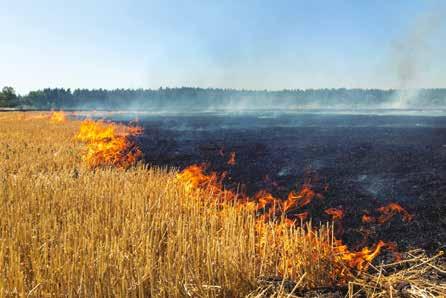
Pastures routinely ploughed and reseeded just before winter saw sediment losses 2.4 times higher than the expected modern background level. In fields growing winter wheat and spring oats, losses surged up to 21.7 times higher than expected.
“These results highlight the fragility of even our best-managed agricultural systems in the face of increasingly extreme winter wet weather,” says Professor Adie Collins, who led the study.
Elevated soil erosion not only depletes farm productivity but also chokes rivers and reservoirs with sediment, damaging habitats, worsening flooding, and increasing water treatment costs.
As climate patterns shift further, better longer terms forecasts could help farmers adapt their land management practices accordingly.
“We urgently need to rethink how we manage agricultural land in the UK if we want to protect the essential ecosystem services farmland provides.”
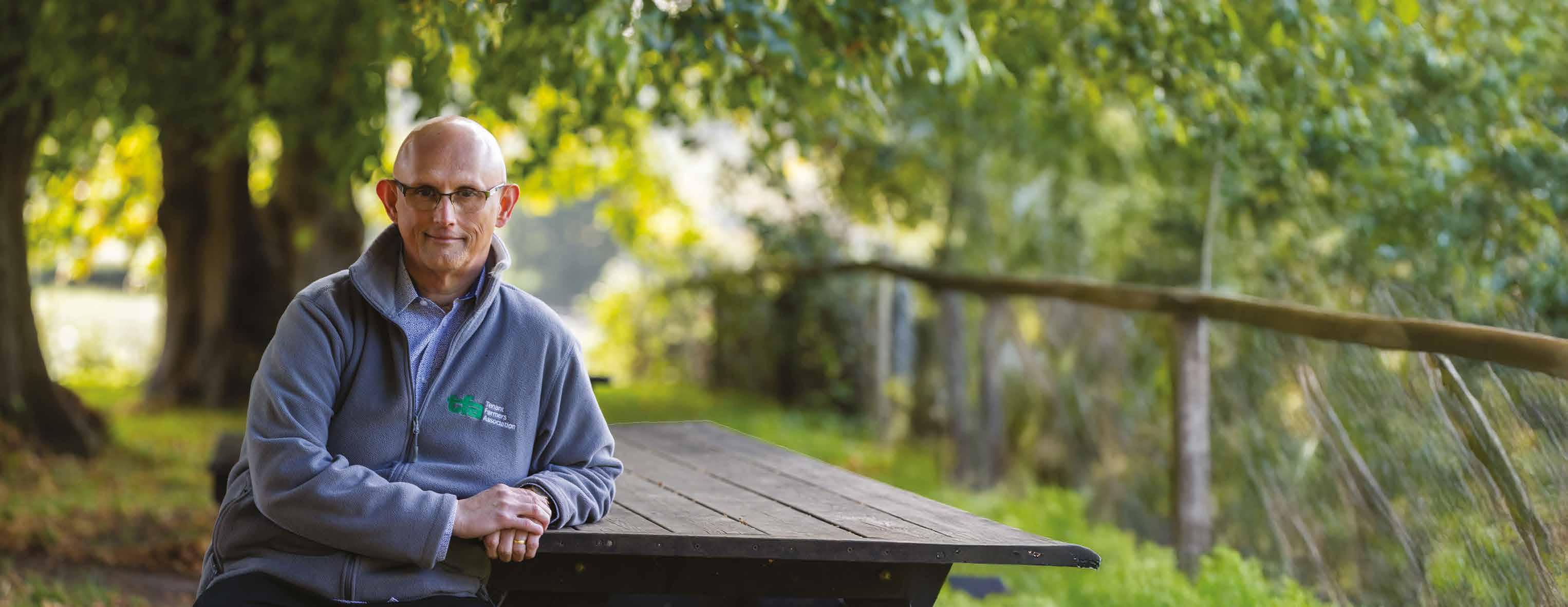
MONDAY EVENING LECTURE: GEORGE DUNN
George Dunn made a compelling case for a thriving tenant farming sector when he delivered the Club’s latest Monday Evening Lecture.
"There has been a lot of doom and gloom in recent months," Mr Dunn told listeners on Monday, 24 April. "From government budgets and trade deals to planning and environmental policy. But tonight, I want to be resolutely positive."
Grounded in decades of sector experience, Mr Dunn said the landlord-tenant structure was integral to the success of British farming, particularly in England and Wales, where approximately one-third of the land is tenanted.
"This share of the farmed area has remained stable for decades," he said, adding that the TFA was formed in 1981 to give a voice to tenant farmers, whose concerns had been overshadowed by the growing dominance of owner-occupiers.
Much of the 20th-century decline in tenanted land was due to estate land being sold off to cover death duties, said Mr Dunn. Meanwhile, long-term tenancies with strong security discouraged some landlords from renting out land.

Yet, since the TFA’s formation, this decline had effectively stopped.
The sector's importance, he argued, was not just about size but strategic necessity. "One-third of our farmland is operated by tenant farmers. If we're serious about food and environmental security, this sector must be supported and understood."
Tenant farms are often found in the most environmentally significant parts of the country, including Areas of Outstanding Natural Beauty and National Parks, which mean they often faced bigger challenges – but had much to offer too.
These areas are increasingly vital to environmental goals such as natural capital promotion and landscape-scale enhancement. "We must ensure that tenant farmers are front and centre in future land use policies," urged Mr Dunn.
Beyond its scale and environmental footprint, the landlord/tenant system also allows for a vital division of expertise. Landowners can focus on stewardship and capital value, while tenants bring entrepreneurial skills to bear in managing day-to-day farming.
"Just because you inherit land doesn’t mean you’re a great farmer. Conversely, not owning land
shouldn’t be a barrier to entering the industry," he said. Talent should be welcomed into agriculture regardless of land ownership.
Recent reforms to tenancy succession rules were also welcomed. Mr Dunn said he supported the abolition of the so-called "commercial unit test," which had unfairly penalised capable successors.
In its place, a more rigorous suitability test now ensures successors are among those shortlisted by reasonable landlords. "It is right that someone inheriting a tenancy with lifetime security must be able to demonstrate they’re a worthy candidate."
Turning to the future of the industry, Mr Dunn argued that tenancies are the main realistic route into farming. While share or contract farming have their place, they lack the security and structure of an agricultural tenancy, he said.
A 2023 survey by the Central Association of Agricultural Valuers revealed that over 8% of tenancies go to new entrants, rising to 20% when there’s a change in land occupier. Even more promising, 35% of those agreements are for five years or longer. "We’re seeing passion and capability from new entrants," said Mr Dunn.
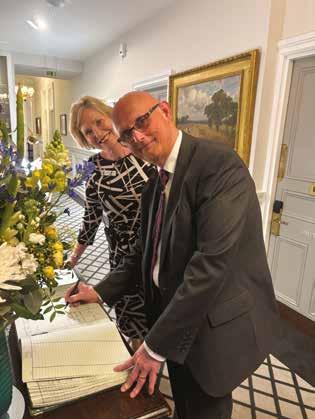
Pointing to Channel 4’s "Our Dream Farm" programme as a public example, he added: "These are not just TV stories. I’ve mentored some of the candidates myself. Their determination is real, and I’m confident we’ll see them succeed."
Mr Dunn recounted a visit to one Eden Valley farm, where a tenant on his second 10-year Farm Business Tenancy told him: "The landlord has spent a lot of money, but we’ve done a lot of work."
This observation exemplified the mutual benefit of a good landlord-tenant relationship.
‘Green’
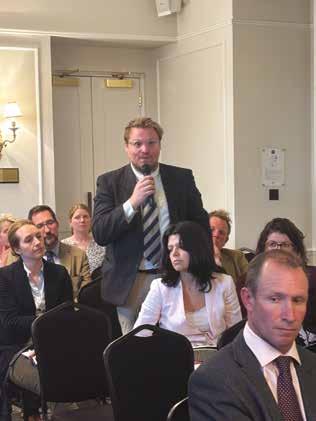
“Owning land is not the same as running a good farm business.”
A new type of tenancy developed by the Crown Estate and Tenant Farmers Association aims to help landlords and tenants reap the benefits of environmental land management.
Launched this spring, the environmental farm business tenancy agreements (eFBTs) set out how landlords and tenants can equitably share the risks and rewards from greener farming practices
“I’m pretty sure [these agreements] will send shivers down the spines of many a lawyer and land agent who have been used to taking a conservative approach to drafting
Flexibility was another strength of the tenancy model, said Mr Dunn. "Land is the most fixed asset in agriculture. Tenancies provide liquidity and adaptability. Businesses can grow or shrink without needing to buy or sell land."
Interestingly, he added, most modern farms were a mix of tenanted and owned land. Yet many farmers still define themselves by where they started. "Tenants who own land still call themselves tenants. But owners who rent rarely identify as tenants."
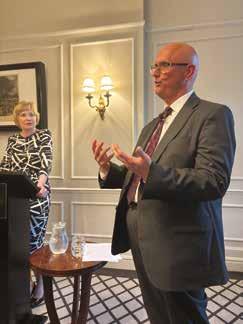
There are other differences too, often when it comes to business performance, said Mr Dunn.
are the
documents – and I see that as a very good thing,” said TFA chief executive George Dunn during his Monday Evening Lecture.
The eFBT works on the basis of a 15-year agreement without open-ended break clauses for the landlord – but with break clauses for the tenant if necessary. The agreements are being gradually rolled out across the Crown Estate.
Crucially, each eFBT contains a mechanism for understanding how to measure biodiversity and carbon, their
baselines and the metrics for determining any uplift – with the financial benefits shared between both parties.
Tenants are actively encouraged to come forward with ideas for diversification – as well as local engagement, education and public access – and how these benefits might be shared between landlord and tenant.
“This could be a major driver towards a complete reimagining of the landlord tenant system in agriculture which is well as producing viable businesses which will also deliver important public benefits for the nation as a whole.”


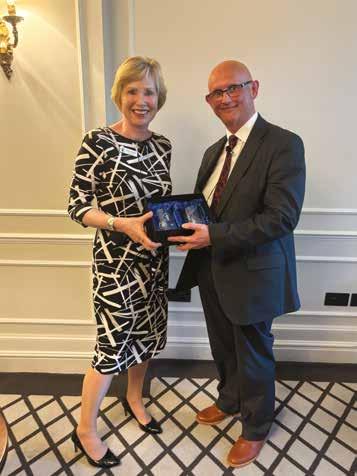
The Central Association of Agricultural Valuers had shown that 42% of tenanted farms achieved a return on capital over 10%, compared to just 4% of owner-occupied farms as recently as 2022/23. "Owning land is not the same as running a good farm business," said Mr Dunn.
Sharing one tenant farmer's comment on the government's planned inheritance tax reform, Mr Dunn said the annual amount of money one owner-occupier said they would have to set aside for inheritance tax was equivalent to the annual rent a tenant farmer pays every year for life.
Looking to the future, the emerging Environmental Farm Business Tenancy (eFBT) agreement model –created by the TFA in partnership with The Crown Estate – promised to unlock new opportunities for both landlords and tenants (see panel, left)
Mr Dunn concluded by praising the Rock Review, which had prompted the government to promise a new commissioner for the tenant farming sector. Trust and cooperation was clearly the way forward for every landlord-tenant relationship, he said.
In closing, he urged all players in the sector –including landlords, tenants, agents and advocates –to make a positive difference by working together. "In that way. lies success," said Mr Dunn.
Bill Young: What do you expect from the government’s appointment of a Commissioner for the Tenant Farming Sector?
George Dunn: As far as I’m concerned, the role is about overseeing the conduct between the two parties – landlord and tenant. We already have a code of practice in place, which is a powerful document in its own right.
But the commissioner might decide, for example, that the code of practice should be incorporated into the contract between landlord and tenant – so what has been a nonstatutory provision could become a contractual provision between the parties.
If it is sold as being something of mutual benefit to both parties then I can really see the commissioner dealing with some real issues of
Farmers Club members quiz TFA chief executive George Dunn
industry and I absolutely agree with Defra secretary Steve Reed in the sense that the biggest issue that we face as a sector is low profitability.
That is a key issue. It doesn't excuse the government from some of the decisions it has made in relation to inheritance tax and closing the Sustainable Farming Incentive to new applications. But I do think profitability is key.
As the TFA, we look forward to sitting down with Minette and talking about how the tenanted sector can play a role in increasing profitability. I have every confidence in Minette – she's a phenomenal individual.
Anthony Snell: We have our own Herefordshire farm – and we also rent other farms for fruit growing. All the rents we pay have increased considerably in what is an incredibly financially challenging time. >>
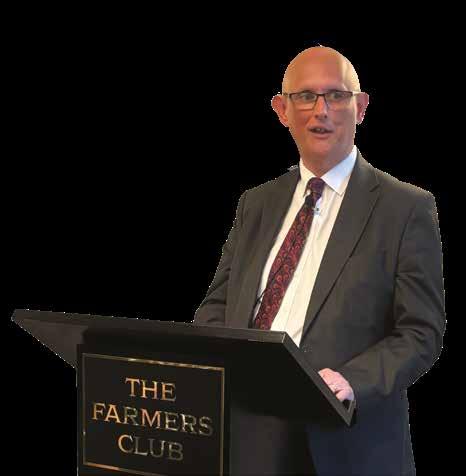
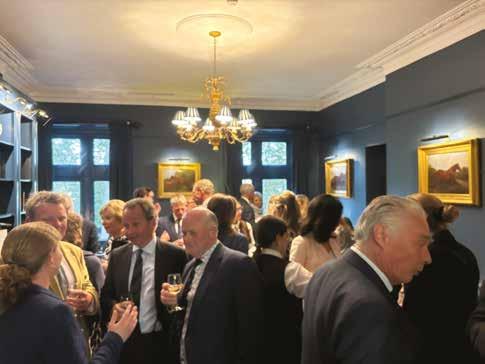
Above: A lively discussion followed
I’m interested to know whether rents have increased nationally or not at all?
GD: Rent is an interesting issue. It always brings an odour around the landlord-tenant relationship. The way rents are set for a Farm Business Tenancy is on the basis of the open market – based on comparable rents paid by other people in the area.
“Not owning land shouldn’t be a barrier to entering the industry.”
“If we're serious about food and environmental security, the tenanted sector must be supported and understood.”
“Tenants who now own land still call themselves tenants. But landowners who rent rarely identify as tenants.”
That means your actions as a tenant in paying a high rent impacts your neighbour. So it's not just a private agreement between you and the landlord – the rent you settle for with your landlord then becomes comparable for the neighbouring holding.
That is where we have great difficulty. And we've seen in certain situations that landlords will pick off those who they consider to be the weaker negotiators so they get higher levels of rent, which then become comparable.
Which is why we say that if you want to agree a high level of rent, that's fine. But try to build in a confidentiality clause so the landlord can’t use that figure against other people. Because what you want for your business shouldn't impact your neightbour.
Johnny Dudgeon: How do we make sure the government is listening when it comes to the impact inheritance tax will have on farming families?
GD: First of all, I have to say that we were absolutely anticipating changes to agricultural property relief (APR) in the autumn Budget – even if Defra secretary Steve Reed says he wasn’t. He was only a few weeks into his job and perhaps he was unware it was going to happen – but for us it was definitely on the horizon.
What came as a real shock were the changes to business property relief (BPR). I am quite sure that when Rachel Reeves made the announcement, she

especially on tenant farmers.
The problem we have is the way the farming industry reacted. The U-turn many people have been calling for – for the whole idea to be scrapped – is completely inconceivable as far as we are concerned. We can’t see it happening.
We have been calling for a finessing of the policy – so it achieves the government’s goals without devastating farming businesses. This could include increasing the threshold, with concessions for longer tenancies, older farmers and those who are terminally ill.
The government is not engaging but there are still plenty of rural Labour MPs who are very concerned about the situation. What we need to do is coral the industry around a message of finessing rather than a U-turn, which is what we are trying to do.
Aled Thomas: How do you see the future for county farms estates in the UK?
GD: My concern about many county farms estates is that they are fixated on new entrants. I am worried that many of them seem to be creating a conveyor belt, rather than a proper progression for people to be able to farm on their own account.
Creating a conveyor belt where people start farming and then drop off the other end is not what it should be about. It should be about creating proper opportunities for people to start farming and then move on in a structured way.
County farms still have a place – of course they do – but there needs to be a bit more imagination in how the county farms estates are operating, where they champion their tenants and help them make that progression.
Harper Adams student Jessica Dook won this year’s Farmers Club Pinnacle Gold Award for farm business management.
Now in its 28th year, the competition identifies future rural business leaders. Sponsored by the Cave Foundation and run with ADAS consultancy, eight finalists attended an assessment day and dinner at The Farmers Club on 8 May.
Entrants from UK colleges and universities were asked to submit detailed farm diversification plans – and demonstrate a firm grasp of business planning, finance, cashflow and sensitivity analysis.
Guest speaker at the award presentation was Claire Taylor, founder of Agvocacy Consulting, who provided outstanding reflection on the challenges and opportunities she has faced in her career in the agricultural sector.
Judges were Professor Nigel
Scollan, of Queens University, Belfast; ADAS technical director business management James Dunn; ADAS agri-business consultant James Drysdale; and Farmers Club Chairman Karen Mercer.
The Club Chairman made the following presentations Pinnacle Gold Award & Nickerson Cup (£2000): Jessica Dook, Harper Adams University.
A comprehensive and detailed business appraisal for a Staffordshire farm, proposing the retention of the arable enterprise, expansion of the sheep flock and introduction of a beef finishing system following the dispersal of the existing dairy herd.
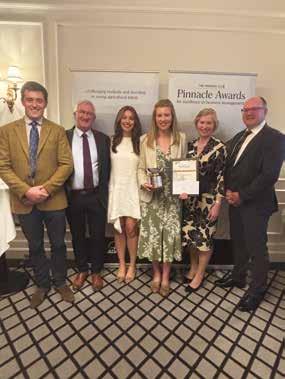
for a potential tenant to take on the tenancy and establish a dairy herd.
Pinnacle Bronze Award (£600): Maisie Rodgers, Harper Adams University.
Pinnacle Silver Award (£1000): Ben James, Aberystwyth University.
A detailed business appraisal for a Cornish farm assessing the viability
A detailed appraisal for a farm diversification near Doncaster investigating the viability of plans to convert an unused semi-detached property into a holiday let.
A well-attended inaugural Ladies in Agriculture dinner saw over 60 members gather to hear from two guest speakers on Friday, 21 March.
Paying tribute to the ladies present, Club Chairman Karen Mercer introduced Farmers Club committee members Sarah Cowlrick and Sophie Dwerryhouse – both well-respected and highly-regarded within the industry and beyond.
Sarah Cowlrick
From an early career in farm business administration and management, today Sarah provides specialist support to the arable sector. She is chief executive of the Association of Independent Crop Consultants (AICC) and a trustee of BASIS.
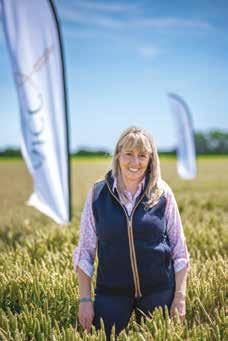
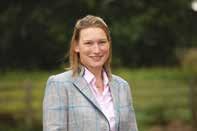
Sarah Cowlrick (top) and Sophie Dwerryhouse (above)
A recent recipient of the British Crop Production Council Award for outstanding services to the crop production industry, Sarah is also chairman of the Hampshire Farms Conservation Competition and a liveryman of the Worshipful Company of Farmers.
Sarah’s interests are strongly linked to farming, but her family comes first with tennis when time allows. She has been a Farmers Club committee member since 2019.
Sophie Dwerryhouse
Sophie is Midlands director of the Country Land and Business Assocaition, with overall responsibility for managing the organisation’s regional business and professional membership.
With a family background in farming, horses and veterinary practice in Shropshire, Sophie wanted a career allowing her to remain in touch with her rural roots.
A Farmers Club committee member since 2022, Sophie’s interests include singing, skiing, eventing and country pursuits. She is secretary of the United Pack in the Welsh borders, a liveryman of the Worshipful Company of Farmers and graduate of the Challenge of Rural Leadership Course.
Karen keenly engaged both Sarah and Sophie in conversation about their lives and careers. The strong camaraderie between the three ladies was palpable and made for a relaxed and inspiring session which was enjoyed by the audience.

Staffordshire has a proud agricultural history and some fine historical landmarks. They include majestic Shugborough Hall and Tutbury Castle – and some stunning landscapes as well, including Cannock Chase and parts of the Peak District National Park.
Yet many people pass through the county without stopping – thanks to its extensive road and rail network. They are missing out. Staffordshire is well worth a visit – as Farmers Club Chairman Karen Mercer was keen to demonstrate during this memorable three-day tour of her home county.
Nestled in the ancient woodland of the National Forest, our base was the Hilton St George's Hotel – home of all the England national football teams –where tracksuits and trainers were replaced by tweed and summer frocks as 64 Farmers Club members settled in for a memorable visit.
Dairy
After an initial introduction over lunch, our first destination was Castle Hayes Farm – home to a dairy herd of 650 Jersey cross cattle run on a New Zealand grazing system by Rupert Major and his father James.
Under a cloudless blue sky, we visited the summer meadows with the inquisitive herd all around us. It was great to get out on the farm, up close with the

cattle and hear how Rupert’s approach to grass-based milk production is benefiting the business as well as the environment in this corner of England.
Rupert explained the efficiency and sustainability of the New Zealand system, how lack of rain this year has affected the cows and milk production – and how the farm strives to minimise lameness in what is a more mobile grazing herd than many.
Technology and innovative thinking – including motion sensors, health monitoring and heat detection – are all assisting stockmanship. It was encouraging to hear how the business recruits staff from the local community – with a long serving and loyal team of skilled employees.
We visited the 300ft-deep Hanbury Crater – site of the largest conventional weapon explosion in either of the two world wars, caused when a single spark from a hammer accidentally detonated a 3,500-tonne munitions depot, to devastating effect, at RAF Fauld on 27 November, 1944.
A total of 70 people lost their lives, and 18 bodies were never recovered in this most terrible event. The Fauld Explosion disaster is commemorated by a memorial, which now sits on the rim of the crater. We gathered as a group in the afternoon sun at the memorial where James Major gave a moving
Above: More than 60 members of The Farmers Club enjoyed the three-day tour
and detailed account of the explosion and its tragic consequences for the local community.
The crater is about a quarter of a mile in diameter and the debris was blown into the North Staffordshire countryside – a fact made all the more poignant with the 80th anniversary of VE-Day and national acts of remembrance taking place only a few days before our visit.
Returning to Castle Hayes Farmhouse, we gratefully accepted a reviving cup of tea as we chatted through the events of the afternoon with our hosts.
That evening, we gathered for a black-tie reception and dinner at St George’s Hotel. Our guest speaker was John Everitt OBE, chief executive of the National Forest Company. He gave an insightful after-dinner talk – explaining how wildlife habitats are being transformed by linking ancient woodlands.
Extensive and rapid tree planting is creating new and more diverse habitats – joining up these woodlands across Staffordshire and the wider Midlands. It is always fascinating to hear from an experienced conservationist and John spoke with clarity and great passion about his work.
We saw many examples of this forestry during our time in Staffordshire – reconnecting local communities back to their ancient trees and
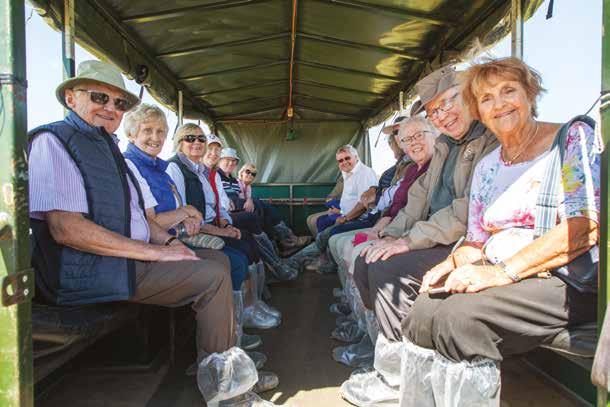

woodlands. They include the National Forest Way, a 75-mile linear walking route, now reclaimed for wildlife, throughout the post-industrial Midlands.
High expectations were exceeded on Tuesday with our visit to Mercer Farming – a highly diversified business including arable cropping alongside pig and poultry enterprises, as well as diversified commercial property interests.
It was a day of unfettered, open and honest access to a fantastic business developed by Roger Mercer, who took on the farm at age 26. Roger now chairs the business, which is run by the fourth generation of the Mercer family: sons Tom, Robert and Alec.
Mercer HQ is based at Blakenhall Park, Barton under Needwood. After an introductory talk by Roger and his three sons, we were coached around Staffordshire, taking in the pig enterprises and a business park at Whittington.
Lunch was a delicious spread of local traditional produce before a tractor and trailer ride took us to see the chicken houses, solar panels, the charitable educational FarmLink project and the Farm Fresh Revolution (see panel below, right)
From the outset, we witnessed the importance placed by the Mercer family on balancing profitable farming in harmony with the environment as they operate a successful collection of enterprises with a common ethos and governance.
Roger and the family are strong advocates of the triple bottom line philosophy of focusing on social and environmental benefits alongside profitability. Their deep-rooted values include looking after the soil, respecting livestock, increasing biodiversity and supporting local communities.
We saw evidence of this approach in spades as the doors of Mercer farming were flung wide open for us. With four generations and more than 100 years of family history, it was unsurprising to discover that the business has interests beyond agriculture, although farming remains core to its success.
Eldest son Tom, a director of Mercer Farming, spoke about his passion for the food sector. In 2006 he set up MOMA Foods, bringing healthy breakfasts to London commuters. Tom started trading from a stall – a filing cabinet on wheels – in Waterloo Station and the first kitchen premises were in a railway arch.
The business expanded to nine station stalls, and then started selling into food service, travel, and grocery sectors. The focus pivoted several times –from the stalls, to bircher muesli, to porridge and latterly to oat milk – but always with oats at the core.
Tom sold MOMA to AG Barr (home of Irn Bru) in 2021 and personally left the business in 2023. He is currently evaluating options inside and outside the food sector and enjoying some family time.
Members were surprised at the depth and extent of diversification in such a professional and agriculturally focused business spread across several counties – including the Packington Free Range brand of free-range poultry, eggs and pork.
Arable enterprises are largely contract farmed. They include wheat, oilseed rape, oats, barley, rye and beans. Potatoes and carrots are grown by a third party. Pig and poultry manure is used as fertiliser and cereal straw is used as livestock bedding.
The estate generates 25MW of renewable energy. It includes a solar farm, solar panels, biomass boilers and ground source heat. An extensive property portfolio includes office space, retail units, industrial and agricultural storage – and a popular pub.
The free-range poultry business, started in 2007, makes sales every week through independent butchers and other outlets. Bird welfare, sustainability and provenance remain a priority.
There are 5,500 outdoor breeding sows across three sites, with 850 gilt pigs sold weekly to butcher shops and Ocado. They are reared in tents before coming into high welfare straw yard sheds. Some 1550 piglets are sold every week – all to RSPCA Freedom Food standards.
Egg production is based on four mobile hen houses at the Patshull Estate. Hens roam on the pastures next to woodland.
A white hen breed has been selected because they are more productive than their brown feathered relations and lay a distinctive bright white egg. The eggs are sold to stockists, kitchens and direct to consumers via egg vending machines.
The access, straight talking, openness and clarity about the family business was exceptional. We learned much and are grateful to Roger, Tom, Robert and Alec – and their team – for the time and effort they took to ensure the farm visit was a success.
Thanksgiving service
After a long day on the farm, it was into posh frocks and jackets before we headed to the idyllic setting of St Leonard’s Church at Wychnor for an evening service of thanksgiving and hope, conducted by Reverend John Allan.
The original church at Wychnor was a simple, small Norman nave. It was extended in the late 1200s, with an aisle and tower added in later years. With its mix of old and new stained-glass windows it is a gem of a rural church sitting proud above the Trent and Mersey Canal.
With the service over, we filed across the adjacent field to Karen’s home, Hill Farm. It was a wonderful evening to entertain members and our tour hosts. Members and guests relaxed and chatted through the
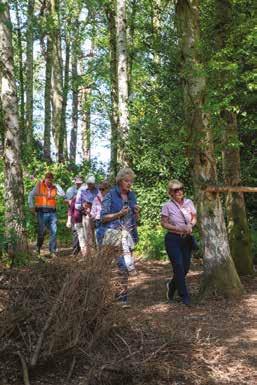
day’s events over a glass of fizz in the garden.
The Abbots Bromley Horn Dance – first performed at the Barthelmy Fair in August 1226 –provided the entertainment. An ancient rural custom, it is rare for the dancers to perform outside Abbots Bromley. But with Karen being born in the village, they were only too willing to perform.
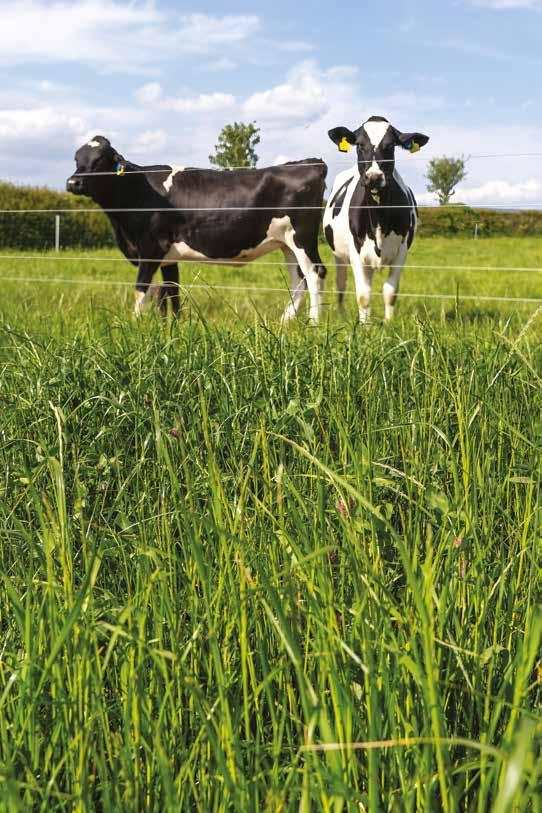
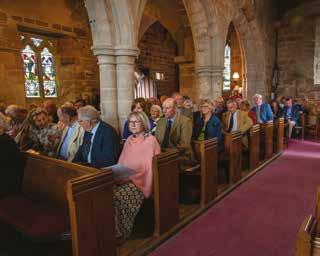
Above (clockwise from top): Grazing at Castle Hayes Farm; thanksgiving at St Leonard's Church; Club members visit the outreach projects
The dancers comprised six deermen, a fool, hobby horse, bowman and Maid Marian. They danced to melodeon music and it didn't take very long after a second glass of fizz for the more outgoing Club members to join the dance.
The Mercer Family Charitable Foundation was established in 2018 to support local and national initiatives focusing on education, healthcare and community.
Activities supported by the foundation include educational projects focusing on farming, agriculture and food; healthcare projects working with people suffering from incurable illnesses; and a focus on Staffordshire communities. We saw two of these initiatives during our tour.
Fresh Farm Revolution is a food delivery project promoting healthy eating, diet and nutrition to schools in Staffordshire. It is a 'grocery bag' pilot project involving nine local primary schools as delivery hubs and six suppliers including meat, vegetables and fruit.
After eight years, Fresh Farm Revolution has supplied more than 56,500 fresh grocery bags to families, providing ingredients to cook 680,000 meals.
Farmlink is an educational project on the Blakenhall Estate, where schools visit to allow children to make the vital connection between food and farming, learn where food really comes from, and understand more about the importance of the environment and conservation.
By the end of the 2024 academic year, more than 50,000 children had been through the project – helping to improve their lives and understanding of food.
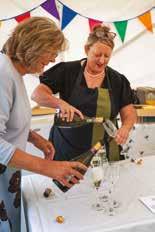


Dinner was taken in a huge marquee on the lawn, with an obligatory Farmers Club quiz to keep members on their toes. Guest speaker was former county high sheriff Simon Clarke DL, who kept us entertained with tales about his passion for horse racing and agriculture.
Sally Mercer and girlfriends then brought a sudden upbeat tempo and delightful series of melodies to life with their stunning singing. It was only a shame we couldn’t stay longer, but the coaches had arrived to take us all back to St George’s.
Our final event of the tour, saw members hosted at JCB's impressive World Headquarters by David Timmis, the global company’s agricultural product and marketing manager.
The JCB story is one of innovation, ambition and sheer hard work. From small beginnings building agricultural tipping trailers in 1945, the company is now a global force in engineering and manufacturing – constantly pushing the boundaries to be the best.
In just 75 years since it was founded by Joseph Cyril Bamford in a garage in Uttoxeter, JCB has become a major global brand renowned for its pioneering spirit with 22 plants on four continents and more than 750 dealers around the world.

Above (clockwise from top left): summer fizz at Hill farm; Roger and Robert Mercer; Karen with Alec, Tom and Robert Mercer; Rupert Major with freshly cut silage
We walked the entire length of the assembly line of the iconic Backhoe Loader – following the production process from the receipt and intake of raw materials, parts, fuels and lubricants through to sheet steel, profiling, laser cutting, welding, paint shop, assembly, testing and the finished vehicle.
It was truly remarkable. We also meandered through the JCB Museum taking a journey of engineering excellence over the past 75 years and better understand where this technically advanced business has come from and its plans for the future.
After lunch, JCB Farms manager John Reid provided an exclusive overview of the JCB Farming operation – providing a remarkable insight into the lesser known side of the company’s farming interests. These include 140 sucker cows, 2,200 Lleyn crossewes, 350 red deer hinds and 5,500 free-range broiler chickens and arable enterprises across 3,600ha on two sites with an abattoir dedicated to the support of Daylesford Organics.
It was indeed a most fantastic and inspiring Chairman's Tour of Staffordshire organised by Karen herself, and we were treated royally throughout.
We learned much and gained extraordinary access, amid joyful laughter and enjoyed ourselves with good food and excellent company.
Athought-provoking time was had by all during our Chairman’s Legal Day –which included a personal tour of the Royal Courts of Justice and the Old Bailey, writes Didi Wheeler.
The Law Courts house the High Court and Court of Appeal of England and Wales. Our guide for the day was Ted Loveday, a barrister specialising in commercial and charity law at Maitland Chamber, who navigated us to the Great Central Hall.
A rabbit warren of 1000 rooms, the courts include 35 lengthy stone corridors and 19 court rooms. In a vacated court room, Ted explained the nitty-gritty of court life, the protocols and judicial procedures and provided an excellent overview of the British judicial system.
Juries here are largely absent, sitting only on cases of libel and slander. Judges alone determine the outcome of other disputes in three divisions: the Chancery, the King’s Bench, and the Family Division
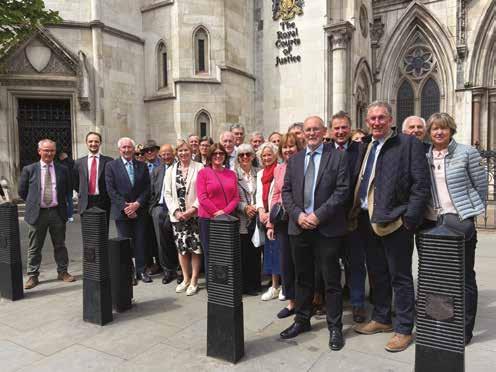
and meandered between Barristers’ chambers and Inner Temple buildings. We arrived at Temple Church where we relaxed in the pews as Reverend Robin GriffithJones regaled us with its history.
The church is the chapel of Inner and Middle Temple, two of London’s four ancient legal colleges – the Inns of Court. Built by the Knights Templar before they were suppressed in 1314, today the church is a Royal Peculiar – answering to the crown, rather than to any bishop.
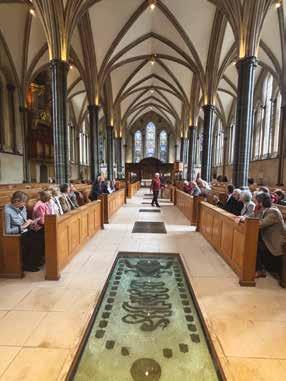
We lingered at the tomb of William Marshall, 1st Earl of Pembroke, often described as ‘the greatest knight who ever lived’. His loyalty to King John against the barons saved the realm from civil war and subjugation by France – but he also negotiated the Magna Carta, the first great ‘bill of rights’.
A quadrangle away brought us to Middle Temple, where head of education Christa Richmond explained how barristers are trained, including the highest standards of advocacy in support of the judiciary and the rule of law.
The Inns are professional societies with a worldwide membership and heritage estate in central London housing chambers from which barristers practise. Members are students, barristers and senior members of the Bar and Judiciary.
The beating heart of the Inn is the iconic Hall. Built in the mid1550s with a hammerbeam roof claimed to be the best in London, it was visited by Elizabeth I in 1578 who inspected the new building and debated with barristers.
One of the dining tables is reputedly made from the timbers of the Golden Hinde – Sir Francis Drake was a barrister at the Inn –and the panelled walls are covered in the coats of arms of senior barristers dating back to 1597.
Snaking our way along Fleet Street, we arrived at our final destination, the Central Criminal Court, more usually known as the Old Bailey, the world's most famous criminal court. David Chalk, sheriff of the City of London, gave us a wonderful tour.
The court has been housed in a succession of buildings over the years since the sixteenth century, when it was attached to the medieval Newgate Prison.
Officially opened by King Edward VII in 1907, the dome of the current court building boasts a gilt bronze statue of Lady Justice, who holds a sword in her right hand and the scales of justice in her left.
Members returned to the Club for dinner and chatted about the day. Matters were drawn to a close by U35s member and Middle Temple barrister Cressida MawdesleyThomas, who provided her thoughts on the profession and her career.
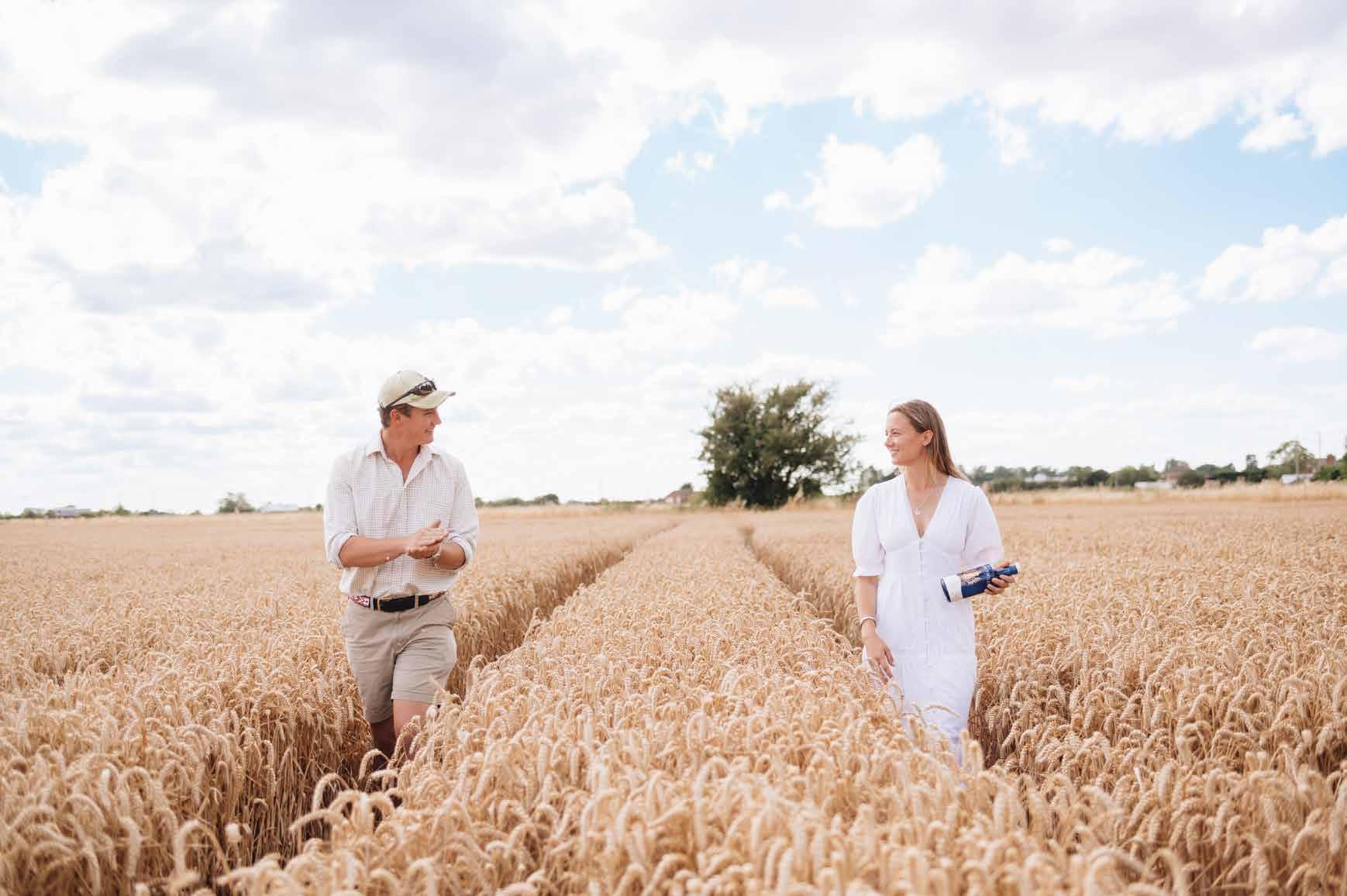
A long-term approach is helping farm-based distilleries fend off a gin-craze hangover.
ALincolnshire farming family is building a successful diversified business by applying farm-to-fork traceability to the premium drinks sector.
Tipplemill Distillery is a small-scale gin producer founded by siblings Lily and James Craven on their family farm at Sutterton, near Boston, located on the edge of the Fens.
Based on the principle of full traceability from grain to glass, the brother and sister team is adding value to one of the farm’s key commodity crops by turning it into a high-quality London dry gin –made from wheat grown on the family's own land.
A compelling backstory and high-quality product are seen as vital for producers seeking to tantalise the tastebuds of increasingly discerning and price-conscious consumers following a decade-long boom in craft gin distillation.
Demand has levelled off, with the marketplace crowded with artisan gins from craft distillers – and big-name brands which have launched their own versions too. All are competing to be the bottle picked from the shelf and poured into a glass.

Deciding to launch their own gin wasn’t a decision taken lightly, says Lily. But both she and James believed they could succeed by creating a quality product which emphasised their family’s heritage as farmers and millers.
“We felt there was a disconnect between all the hard work we do growing a crop – all the stress – and then selling it but not necessarily knowing who it’s going to, who’s consuming it.”
Farm to bottle
“We felt there was something more we could be doing with our business to meet and get to know our customers – and bring them some enjoyment. We chose gin because it’s a very sociable drink.”
The distillation process starts by taking milling wheat from the family farm to nearby Moulton Windmill. Using local wind power to mill the grain helps emphasise Tipplemill’s environmental ethos and partnerships with other nearby businesses
Elderflower and sweet fennel botanicals give the gin a subtle yet distinctive floral and aniseed taste. These ingredients are selected >>
for their relevance to the surrounding countryside and family history, reinforcing the gin’s local status. Botanicals from further afield include Italian juniper berries. Despite the distance, provenance remains key, with Lily travelling to Tuscany to meet the growers and see where they are picked.
“People are very surprised when I ask whether we can have some information on the farmers that they’re coming from. But it’s important that we can tell people the exact location where all our ingredients come from.”
London Dry designation requires that flavouring takes place during the distillation process only, without any post-distillation additions such as sugars or colours. Both Lily and James see this as a benchmark that aligns with their overall strategy.
Using their own wheat to create the base spirit means more control over the production process compared to gin producers who purchase neutral spirit from third parties, explains James.
Tipplemill is bottled at a slightly higher ABV than market average, which contributes to its smoothness and depth. And the bottle itself is distinctive – a deep shade of blue with gold lettering, recalling the big skies and golden wheat fields of Lincolnshire.
The gin achieved early external recognition, with double gold awards at both the San Francisco and New York World Spirits Competitions. While not a guarantee of long-term market success, they have validated its position as a standout product.
The distillery is managed as a separate venture alongside the family’s broader farming operations. It does not currently share significant infrastructure or labour with the main farm but benefits from its location and access to raw materials.
Lily and James represent a younger generation of farmers interested in engaging more directly with consumers. Their father remains active in the farming business and has supported the diversification initiative.
This hands-on engagement includes visiting bars and restaurants directly and attending events to promote the product. It has helped establish credibility and build relationships in what remains a competitive sector.
With growing consumer interest in supply chain transparency, sustainability is central to the Tipplemill approach – and the bottle label proclaims that the gin is produced in harmony with nature.
Around 18% of the farm is managed for the environment, including wildlife and other
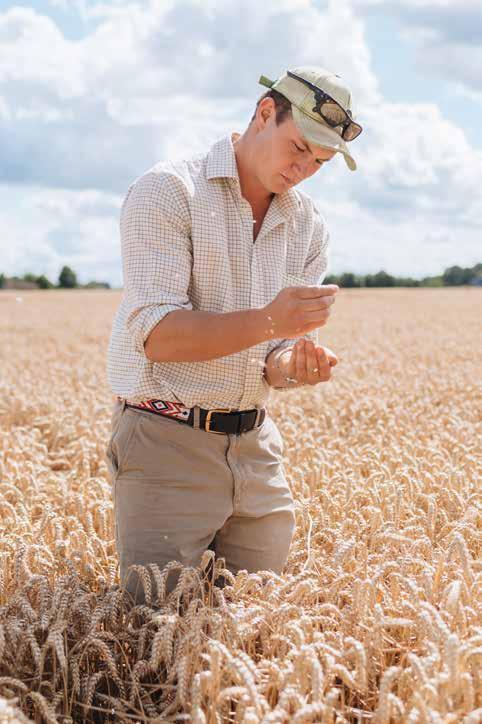
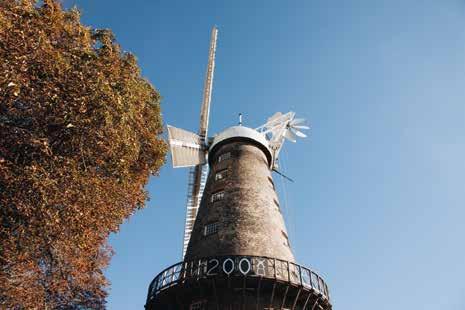

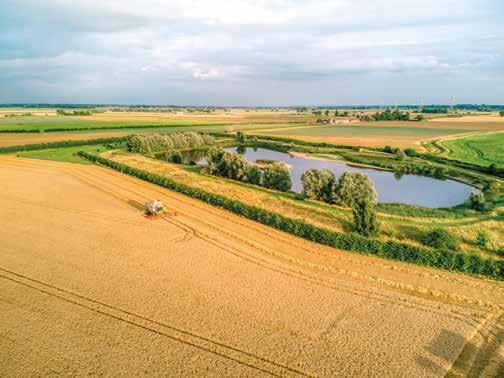
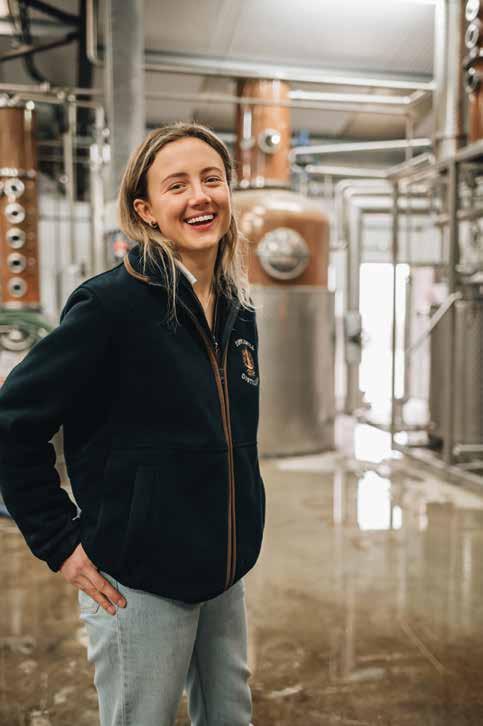
Artisan gin makers are focusing on quality and provenance to maintain sales following a decade-long boom which saw hundreds of distilleries set up in the UK.
A relaxation of licensing rules allowing smaller stills to go into production meant distillery numbers soared from 190 in 2015 to more than 800 in 2022, according to the Office for National Statistics.
The craze for artisan flavoured gins using unusual botanicals was further fuelled by lockdown – with scores of small-scale producers using their own exotic ingredients in increasingly imaginative bottles.
UK gin sales soared – reaching 96 million bottles in during the first lockdown year of 2020. Everyone from Buckingham Palace to Jeremy Clarkson launching their own brands.
But the market has since cooled with some experts warning of “consumer confusion” when faced with so much choice. Others say drinkers are seeking out other unusually flavoured spirits, including tequila.
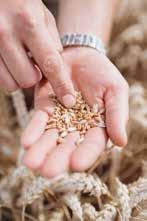
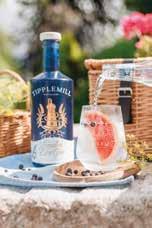
biodiversity initiatives. It also belongs to the LEAF (Linking Environment and Farming) programme.
Competing with big brands and other craft producers is a challenge for any small business. Lily and James are focusing on three key differentiators: product quality, traceable sourcing, and direct engagement with buyers.
While their online store provides nationwide access, the founders are prioritising product consistency and brand integrity over rapid expansion. This includes targeting upmarket hostelries and bars – including the Farmers Club –who are keen to stock premium products.
Some bars are reducing the number of products they carry, acknowledges Lily. But they remain increasingly interested in high quality food and drink products with a clear backstory and transparent supply chain, she adds.
“We want people to know where their food and drink comes from," concludes Lily. “The distillery offers one way of achieving that aim, while also providing a way for our farming business to adapt successfully to modern markets.”


A summer welcome from our food and beverage manager Ben Nicholas
We’ve launched a special Gin & Tonic Menu this summer here at The Farmers Club – specially designed to complement our seasonal terrace offerings by head chef Paul Hogben.
You’ll notice a curated selection of new British gins making their way onto our shelves, from Old Tom and London Dry to Plymouth Gin. Together, they offer members a well-rounded and refreshing choice to those we already stock.
It’s a taste of what’s to come since I joined The Farmers Club in mid-May. I haven’t had the chance to meet many of you just yet, so I wanted to take this opportunity to briefly introduce myself and share a glimpse of what I have to offer.
My journey in hospitality began at age 16, working as a kitchen porter. It didn’t take long for me to fall in love with the buzz of the profession – the camaraderie, the energy and the relationships formed in a busy kitchen.
Like many youngsters, I wasn’t entirely sure what to do after completing my A-Levels. But I knew I enjoyed the kitchen and catering, so I pursued a degree in hospitality management at Huddersfield University.
“Travel has shaped who I am”

After four years of study – and plenty of student debt – I ventured into the world of hospitality. I spent the next eight years working across a variety of hotels and private members’ clubs. Then the travel bug hit.
Despite having no foreign language skills, I was fortunate to land a job in the United Arab Emirates, where English is widely spoken. Dubai was home for nearly seven years. In that time, I worked with Jumeirah, InterContinental Hotels and Lexus, gaining experience in new hotel and restaurant openings as well as golf club management.
After a while, the glitz and glamour of the man-made city wore thin, and I craved a more grounded environment. That led me to the Philippines, where I joined Shangri-La and then Conrad. It’s a stunning country and I’m grateful for the experience, particularly during the challenges of 2020.
The time I spent there was made even more special with the birth of my daughter. With her future and education in mind, returning to the UK was always on the horizon. We made that move in 2023 and have been happily settled since.
Travel has shaped much of who I am, and my professional experience is rooted in the luxury hospitality sector. As such, I place a high value on delivering excellent service and meaningful experiences for both members and guests.
I’m also someone who loves to try new things – be it products, concepts or events. Hence our summer Gin & Tonic Menu. I’d genuinely welcome your ideas and suggestions for what you’d like to see in our food and beverage offerings.
If you have thoughts or feedback, whether it’s a new spirit you’ve discovered, an event idea or even a dish you think could shine on the menu, please get in touch. You can contact me directly at: fandbmanager@ thefarmersclub.com.
I’m truly excited to be part of the Club and look forward to meeting each of you in due course. Here’s to a summer of good food, good drink and great company.



TThere’s nothing better than good food with good friends, writes head chef Paul Hogben
wice this year – once in March and again in May – the Club took on a new rhythm. The air thickened with the scent of sizzling meat, chatter filled the dining room, and something simple but special unfolded: our Steak Festivals.
There were beautiful steaks – thick, marbled and cooked just so – but the week also offered up something broader. It was about sharing. Sitting around a table with good friends, discovering new flavours, and remembering why food like this matters.
As guests arrived, the atmosphere took on a quiet buzz – friends gathered over generous platters, solo diners took their seats with eager anticipation, and a hum of contentment took hold.
There’s a reason beef sits at the heart of a steak week. It’s comforting, it’s nostalgic, and done right, it’s unforgettable. We started with steak tartare – a dish that still surprises people with its elegance. Then there was the bar favourite: a hanger steak roll, filled with crispy onions and peppery mayo, served with a pint and a nod of approval.
In the Restaurant and on the Terrace, the showstoppers came out. Rump with blue cheese butter. Fillet on the bone that melted at the touch of a fork. T-bones devoured to the bone. And for those in the mood to share, the bone-in rib eye never failed to get attention when it hit the table.
But there was more. Our pork –Blythburgh free-range – offered its own indulgence, from centre-cut fillets to the smoky rib eye, each one resting under a spoonful of flavoured butter. And that
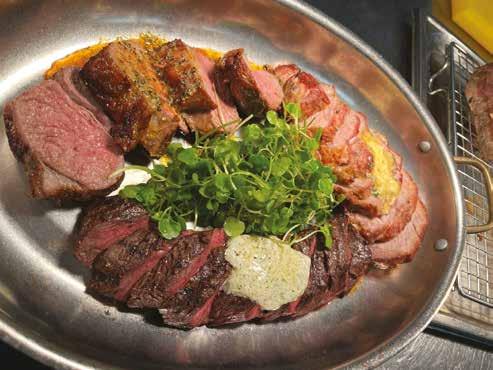
Tomahawk chop from Fitzjohn’s Farm? Impossible to miss, impossible not to want once you saw it go by.
Cornish lamb brought a deeper flavour: gamey rump, tender leg, and an unexpected T-bone that some guests tried for the first time and were delighted they did.
We also opened up the grill to the sea. Fish steaks were a beautiful contrast – lighter, but just as flavourful. Halibut and salmon were offered on the bone, each one carefully cooked to preserve its delicate texture.
Smoked stone bass, paired with seaweed butter, reminded us just how well land and sea can meet on a plate. But it was the monkfish tail that really made people pause – marinated in warm tandoori spice, grilled and served with mint chutney, it drew smiles of surprise from even the most committed carnivores.
We knew not everyone would come for meat and we didn’t want anyone to feel left out. Our vegetarian steaks weren’t just a nod – they were the real deal. The aubergine, dressed with black garlic and sesame, sat beautifully with ribbons of courgette and roasted peppers. And the cauliflower – soft inside, roasted at the edges – came with butterbeans and spiced herb relish. These weren’t alternatives: they were equal players in the week’s menu.
For me, full tables, empty plates and happy faces are what it’s all about. Thank you for making these events what they were. We enjoyed them as much as you did.
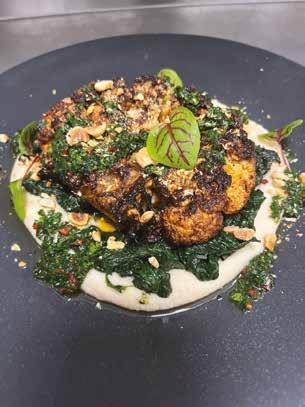
“It’s comforting and nostalgic. Unforgettable”
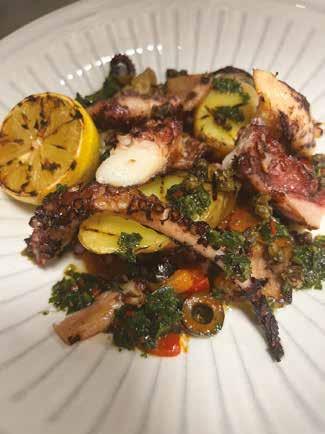


Head chef Paul Hogben pays tribute to The Farmers Club as he prepares to retire
After almost 50 years in the hospitality industry, it’s time to hang up my apron, put away my knives and enjoy more time with my growing family – especially embracing my new role as a proud grandad.
My love for food began in the kitchens of my mother and grandmother during my childhood. I fondly remember licking bowls clean and breathing in the comforting smells of home cooking. Sundays were spent standing beside my father carving the roast and sneaking the sweet, crispy bits off the board before they made it to the plate.
At school, I was one of the few boys allowed into the food technology classes, where I developed basic kitchen skills. That passion led me to study professional cookery at Thanet College, where I began to dream of where this career could take me. London seemed the obvious next step, but the sea air had already won me over.
Starting out
My first major role was at The Metropole Hotel in Brighton, then owned by Lonrho, under the leadership of business magnate Tiny Rowland, a man I was lucky enough to meet a few times.
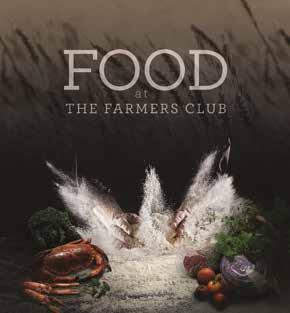
Seven years passed quickly, filled with opportunities at various ventures within the group,
including three years in their Michelin Restaurant, until I returned to West Kent. There, I worked in boutique hotels and fine dining restaurants and eventually ran my own business at a Royal Golf Club in East Sussex. I also became a father of three wonderful children and a partner in what would become a very successful pub, though the demands took their toll and life took a dramatic turn.
Eventually, I found my way back to West Kent, this time to teach the subject I had come to love. It was an incredibly rewarding time, guiding and inspiring new chefs, many of whom have gone on to successful careers, both in and out of the kitchen. This was also where l would meet, fall in love with and marry Jeannette, thus extending our family to five children, who are now creating wonderful grandchildren for both of us to enjoy.
Remarkable years
My teaching led to collaborations with major names and venues: Twickenham, Wimbledon, Cheltenham, the Chelsea Flower Show and Henley. I worked
The Farmers Club’s first ever book about food highlights the integral part food has played in the Club’s development over the past decade.
Written by Farmers Club head chef Paul Hogben with photos by Jonathan Pollock, Food at the Farmers Club is a mouth-watering journey through the seasons – including seasonal recipes and the produce available to use.
Provenance has been highlighted along with some loyal suppliers that have stayed the course over the recent years and have supported the books creation – all accompanied by some stunning pictures.
A selection of recipes from dishes that have appeared on the club menus have been adapted for home use so that you can recreate them and further modify to suit. All have been carefully tested by the Club team, friends and family.
Copies cost £29 plus £5 postage and packing. To order your copy of Food at the Farmers Club, please call the Club on call 020 7930 3557.

alongside world-renowned chefs, including the late, great Albert Roux, who became a dear friend.
I then spent three years at the All England Club, Wimbledon, including during the Olympics, constantly evolving our culinary offerings. After a brief time supporting a friend’s fledgling business, I found what would be my final chapter: The Farmers Club.
Eleven years on, I look back with pride at how far we’ve come. From the kitchen team – some of whom have been with me nearly from the start – to our loyal members and incredible suppliers. Together, we have elevated the Club’s food to a level that rivals the very finest clubs in London.
I am deeply grateful for every moment and every person who has shared this journey. Your support, feedback and camaraderie have meant the world. I step away from the stove with a full heart, fond
I am deeply grateful to you all” “
memories and the hope that the Club continues to thrive. Thank you all.
Chief executive's comment:
Paul’s words paint a clear journey of his professional career, but don’t do justice to his considerable personal energy, enthusiasm, innovation and skill, writes Club chief executive Didi Wheeler.
Paul’s impact has been clear to all. During my time at the Club, I have witnessed a leadership style that nurtures talent, encourages ideas and skills, and sources the very best of British produce in the delivery of an outstanding quality of food.
It is a reputation renowned in London’s clubland. Without doubt, the Kitchen Brigade would not be what it is today, were it not for Paul Hogben. Paul will always be a close friend of the Club – and I know we all wish him the very best in his retirement.


The Farmers Club organises a wide range of events each year, including farm walks and study tours, cultural and social visits, receptions at farm shows and special events at the Club itself >>
Our calendar of activities for Summer and Autumn has something for everyone. For full details about any event – and to book your place, please call 020 7930 3751 ext 6 or scan the QR code.
FRIDAY 4 JULY
Club reception with guest speaker Marion Regan, a fifth-generation owner of Kent-
based Hugh Lowe Farms and supplier of strawberries to the Wimbledown Tennis Championships for over 25 years.
SUNDAY 6 JULY
First held in 1839, the Henley Royal Regatta is one of the world’s most prestigious rowing events, set against the stunning backdrop of the River Thames. A high-energy competition with refined elegance, it is an unforgettable experience.
For Farmers Club members, the regatta offers a perfect blend of food, drink, and entertainment. Thanks to the
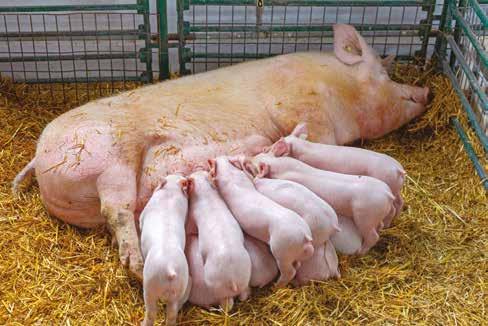
We are delighted to announce the next titles in our much-loved Book Club series. As always, each evening begins with a talk from the author, followed by a Club dinner and drinks hosted with the author.
THE PROFITABLE FARM –CHRIS CLARK AND BRIAN SCANLON
DATE TBC
The Profitable Farm is a practical and timely guide to running a sustainable and financially successful farm. Drawing from extensive experience in agriculture and consultancy, the authors provide actionable insights on everything from crop management to natural capital.
Chris Clark, a former management consultant turned farmer, revolutionised Nethergill Farm using
the book’s core principles. He is joined by co-author Brian Scanlon, whose background in science and economics brings a fresh perspective to agricultural business strategy.
THE COMMUTER PIG KEEPER –MICHAELA GILES
DATE TBC
This practical and encouraging guide is ideal for those looking to keep pigs while balancing busy modern lives. From selecting breeds and housing to handling, health, and contingency planning, it’s a must-read for smallscale and first-time pig keepers. Michaela Giles brings decades of experience in livestock health and is an active member of several national pig health organisations. She also writes regularly for Practical Pigs magazine.
generosity of the Copas Family, members can enjoy the exclusive Temple Island Enclosure at Fredenham Farm.
From this prime location, members and their guests can take in panoramic views of Temple Island and the regatta course – all while enjoying unparalleled hospitality provided in partnership with Ambro Events.
This exclusive event includes a private boat tour, champagne reception and four-course lunch, followed by afternoon tea with strawberries and cream. Guests also enjoy a complimentary bar including Pimms, wine, beer, house spirits and soft drinks.
TUESDAY 8 JULY (FROM 4PM)
Fully booked – please join waitlist
The Farmers Club is delighted to be holding a joint reception with Strutt & Parker in their marquee at the show.
Strutt & Parker senior director David Slack has very generously allowed Farmers Club Members to make use of their hospitality and their professional team of advisors and directors in their Marquee throughout all the days of the Show. Tickets for the reception are £10 per person, including drinks and canapes. Please note that tickets to the show itself must be purchased separately.
STEPNEY GREEN CITY FARM DATE TBC
To complement our floral celebrations, we are thrilled to offer this immersive session presented by Pearly Queen Honey, who will introduce you to the vital role bees play in pollination, an essential process that supports the growth of the beautiful flowers we’ll feature in a bouquet workshop.
Throughout this hands-on session, you will learn about the anatomy and lifecycle of bees, including the fascinating role of the Queen and the process of swarming. You will also gain an understanding of beekeeping tools and equipment and learn the step-by-step process of setting up and managing a beehive. Additionally, we will explore the current challenges bees face, such as habitat loss and climate change, and how these factors impact their survival.
Weather permitting, we’ll head outside at Stepney Green City Farm for a live demonstration, where you’ll have the
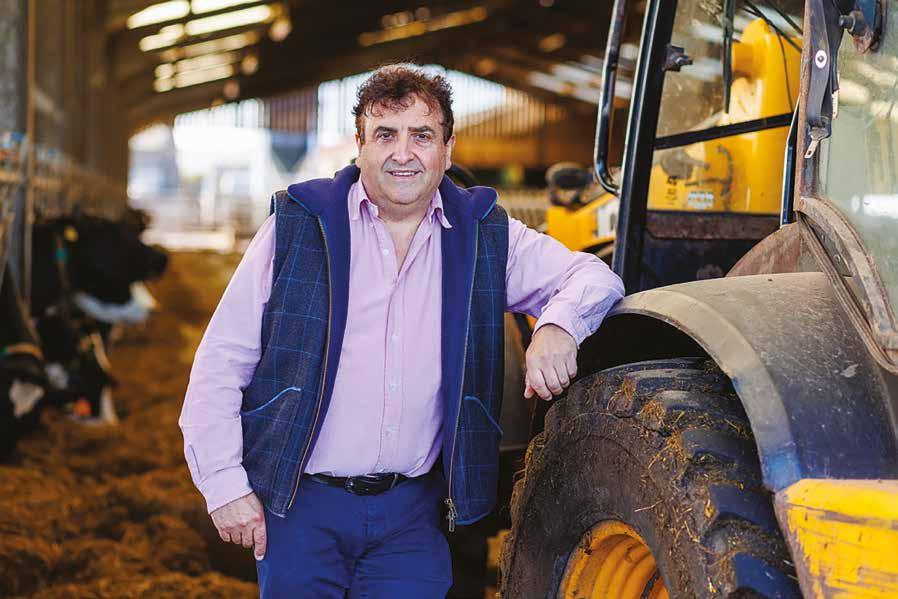
Our season of farm visits continues – all carefully chosen by Club chairman Karen Mercer for the interest and insight they offer Club members.
HANLEY FARM
Chepstow, Wednesday 23 July
Kindly hosted by organic dairy farmer Lyndon Edwards (pictured above), who is also chairman of the Dairy Sector Council at AHDB Dairy.
“As a farmer, our philosophy is for our animals to be free range and grazing lush organic pastures, supplemented by traditional home-grown crops,” he says.
Those crops include hay, silage, lucerne, maize, barley, peas and kale. But the farm is also highly diversified. It includes a veterinary centre (2006), a business centre (2008) and the development of an 0.8ha (2acre) landshare scheme with the local community (2011), which supplies the Hanley Farm
opportunity to open a hive and observe bees in action. Afterward, you can enjoy a honey-tasting session featuring a variety of urban honey. Cost: £130pp
AGM BUFFET LUNCH
& GUEST SPEAKER
TUESDAY 15 JULY
Our guest speaker for this year’s AGM buffet lunch is nutritionist Anna Taylor
Shop with some of its fruit, vegetables and flowers. The shop itself opened in 2013 following the extensive and careful renovation of an 18th century coach house.
The farm has accrued many awards, including four Great Taste Awards, the Wye Valley AONB Farmer Award, Sustainable Farmer of the Year (runnerup) in the National Farming Awards and Small Farm Shop of the Year Award.
Herefordshire/Worcestershire
Friday 5 September
Kindly hosted by Ali Capper, this highly successful 200-year-old family farm has 40ha (100 acres) of hops (nine varieties) and 40ha (100 acres) of apples (three dessert varieties and two cider varieties).
The farm uses sustainable methods to balance profitable agriculture while caring for the environment. Hops are
OBE, chief executive of the Food Foundation, which campaigns for changes in food policy and business practice to ensure everyone in the UK can afford and access a healthy diet.
HORSE GUARDS PARADE
WEDNESDAY 16 / THURSDAY 17 JULY
A long-standing Member favourite, this
transported globally and supply the onsite brewery to make beer and ale. Apples are for juice and cider, including to UK supermarkets.
Shropshire, Friday 3 October
Kindly hosted by vice chancellor Ken Sloan, the university estate includes 307ha (759 acres) of owned land, with a further 187ha (462 acres) rented through a range of short-term tenure agreements.
Cropping is based on cereals, oilseeds, forages, maize and grassland. Livestock enterprises include a dairy herd, sheep, beef, pig and poultry units.
Amenity areas within the university estate include woodland, ponds, water courses and stewardship sites.
To secure your place on one of our Chairman’s Farm Visits, please email memexpmanager@thefarmersclub.com
year’s Beating Retreat is themed ‘Heroes’ and promises to be a stirring spectacle of pageantry, music, and world-class military horsemanship.
Set on the historic Horse Guards Parade, the Massed Bands of the Household Division – including the Duchess of Edinburgh’s String Orchestra, the State Trumpeters of the Household Cavalry, and the Pipes and Drums – will
perform a dazzling display of precision drill and musical mastery.
The evening concludes with a fireworks display in what is widely regarded as one of the most memorable military spectacles in the world.
CART MARKING CEREMONY AND LUNCH
LONDON GUILDHALL
SATURDAY 19 JULY
Thanks to the generosity of a fellow Member, we are delighted to offer Club Members the opportunity to attend the historic Cart Marking Ceremony, hosted by the Worshipful Company of Carmen.
This 500-year-old tradition celebrates the evolution of transport, showcasing everything from handcarts and horsedrawn carriages to cutting-edge electric, solar-powered, and hydrogen vehicles.
The ceremony is presided over by robed Livery Masters, alongside the Lord Mayor and Lady Mayoress. Following the event, Members will enjoy a drinks reception and a formal lunch in the magnificent Guildhall – a unique setting at the heart of the City of London.
ROYAL WELSH SHOW
BUILTH WELLS
MONDAY 21 JULY
Joint reception with the Royal Agricultural Society of the Commonwealth. Guest speaker: NFU Cymru Director John Mercer.
THE FARMERS CLUB BOOK CLUB THE PROFITABLE FARM –CHRIS CLARK AND BRIAN SCANLON
DATE TBC
See panel on p36
CHAIRMAN’S FARM WALK HANLEY FARM, CHEPSTOW
WEDNESDAY 23 JULY
See panel on page 37
U35s SUMMER CEILIDH AT THE CALEDONIAN CLUB
FRIDAY 25 JULY
Following our collaborative event last June, where we welcomed members of The Caledonian Club to The Farmers Club for our ‘Taste of Scotland’ Summer Dinner, we’re delighted to now be invited in return this July.
The Caledonian Club Younger Members warmly welcome The Farmers Club U35s to their Belgravia Clubhouse. We’ll kick off the evening with bubbles on the terrace, followed by a delicious dinner featuring classic Scottish fare. Then it’s time to ceilidh the night away with the fabulous Dun Reels Band.
The bar of the Club has over 200 whiskies and a growing collection of Scottish gins.
Cost: £75pp (Members); £90pp (Guests) Dress Code: Black Tie or Highland Dress
LEARN SOMETHING NEW SERIES POTTERY WORKSHOP –INTRODUCTION TO THE POTTER’S WHEEL
MONDAY 29 JULY
THE FARMERS CLUB
See panel below
U35s ASTON MULLINS STUD TOUR & ASCOT
RACES – DUBAI DUTY FREE SHERGAR CUP
ASCOT, BERKSHIRE
SATURDAY 9 AUGUST
With the kind permission of the Hope family, the day will begin with coffee and pastries, followed by an exclusive tour of Aston Mullins Stud, where we hope to see some foals on the ground – future champions in the making, perhaps.
After the tour, we’ll quickly change into our race day attire and board a private coach to Ascot, where we’ll spend the day in a private box.
Upon arrival at Ascot, we’ll enjoy a glass of champagne, indulge in a traditional afternoon tea, and take in the racing action from a fantastic vantage point. After the races, we’ll head to the post-racing concert.
Cost: £112.50pp
We’re excited to continue our Learn Something New series, offering Members the chance to develop hands-on skills in a relaxed and social setting.

Following the popularity of our first session, we are pleased to offer another beginnerfriendly pottery workshop.
In this 2.5-hour class, participants will learn the fundamentals of working with clay — from preparing and centring to throwing on the wheel and adding decorative textures. You will learn:
• How to prepare and centre clay
• Basic throwing techniques
• Surface decoration and finishing Finished pieces will be glazed and fired, ready for collection from the
Club within four weeks. This is a fun, creative experience for those new to the craft.
BRITISH WOOL – SHEEP NEEDLE FELTING WORKSHOP AT THE FARMERS CLUB
THURSDAY 11 SEPTEMBER
Led by Emma Harrison of Spitalfields City Farm, this engaging workshop explores the heritage of British wool and native sheep breeds through the traditional art and craft of needle felting.
The day includes:
• A needle felting tutorial
• Insights into wool and British sheep breeds
• A two-course lunch
• Tea, coffee and homemade treats Participants will leave with their own handcrafted sheep – a delightful keepsake from an informative and relaxing day.
All skill levels welcome.
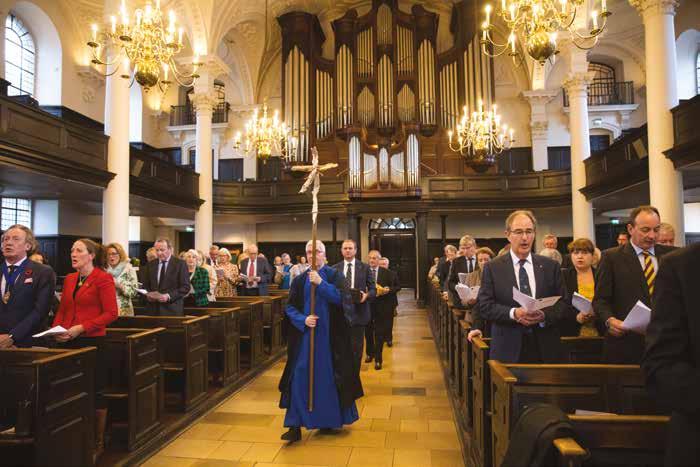
WEDNESDAY 15 OCTOBER
Join us for one of our most cherished traditions – our annual Harvest Festival Service followed by a superb supper back at the Club.
The service will take place at St. Martin-in-the-Fields at 5:00pm, led this year by Rev John Allan. A wonderful venue, the church
MILITARY TATTOO 2025
THURSDAY 14 AUGUST
Fully booked – please join waitlist
Attend the spectacular world famous Royal Edinburgh Military Tattoo. Witness this time-honoured global phenomenom from the comfort of premium seats, including an exclusive behind-the-scenes tour and a bespoke performance by Tattoo cast members, with a backstage peek at pre-show preparations.
You will enjoy exceptional views of the Tattoo, skip the queue with fasttrack access and head straight to your seat. Includes a three-course Scottish feast featuring whisky, wine, coffee, tea,
has outstanding acoustics and stunning architecture.
Following the service, members and guests are warmly invited back to the Club for a celebratory three-course plated dinner. This traditional harvest menu will feature the finest of British seasonal produce, Cost: £85pp
and Scottish tablet. Take home a 75thAnniversary Show Programme. Cost: £475pp without accommodation/ transfers; £615pp including one night in a shared standard room at the Dakota Hotel Edinburgh (£100 single supplement).
FRIDAY 5 SEPTEMBER
See panel, page 37
TUESDAY 9 SEPTEMBER
The Club’s special annual lunch for honorary members typically includes a harvest prayer, a discussion of farming issues and challenges – as well as our customary social gathering with good food and wine.
WEDNESDAY, 10, SEPTEMBER
Club reception with guest speaker Robbie Tuer, former chairman of Cumbria YFC and now national chairman of the YFC Agri-Steering Group.
U35s INAUGURAL TENNIS TOURNAMENT
For details, contact U35s chairman Ben Barton on 07992 812378
THE FARMERS CLUB BOOK CLUB THE COMMUTER PIG KEEPER – MICHAELA GILES
DATE TBC
See panel, page 36
>>
LEARN SOMETHING NEW SERIES
BRITISH WOOL – SHEEP NEEDLE FELTING WORKSHOP
THURSDAY 11 SEPTEMBER
See panel on page 38
HERCULES THE MUSICAL –GROUP THEATRE OUTING LONDON
FRIDAY 12 SEPTEMBER
A special Farmers Club visit to the iconic Theatre Royal Drury Lane to see the musical inspired by the Disney animation. A magical retelling of the hero’s tale through music and myth, this production promises fun and adventure for Members of all ages – families welcome. Written by Tony award winners Robert Horn and Kwame Kwei-Armah, and directed by Casey Nicholaw
THE FARMERS CLUB BOOK CLUB THE COMMUTER PIG KEEPER – MICHAELA GILES
TUESDAY, 16 SEPTEMBER
See panel, page 36
GEORGE STUBBS –‘THE ENGLISH LEONARDO’
MONDAY 22 SEPTEMBER
See panel below
U35s JILL WILLOWS TRAINING DAY AND AUTUMN DINNER
FRIDAY 26 SEPTEMBER
Our second Jill Willows Training Day will be followed by our U35s Autumn Dinner at the Club. For details, contact U35s chairman Ben Barton on 07992 812378.
For a full list of other U35s events, please see page 44.
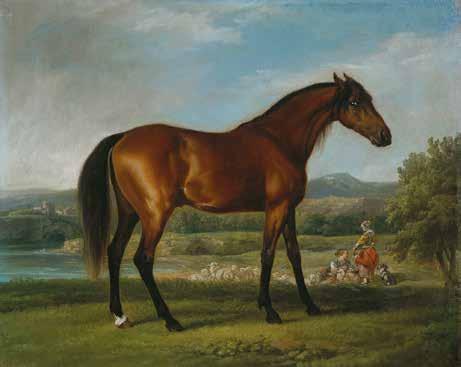
Hollyhock c.1767-70, George Stubbs
Private lecture by art historian Christopher Garibaldi, former director of the National Horseracing Museum, about self-trained 18th century English artist George Stubbs, best known for his paintings of horses.
This event promises to be an enriching and insightful journey into the world of Stubbs, whose remarkable talent captured the beauty and grace of equestrian subjects, with his masterpiece Whistlejacket, housed in the National Gallery, just down the road from the Club, being one of his most
celebrated works.
The lecture will delve deep into Stubbs’ unique ability to portray horses with unparalleled realism, as well as his broader contributions to the world of art. Christopher Garibaldi will explore not only the equestrian paintings that made Stubbs famous but also the lesserknown aspects of his work, which cover a diverse range of themes from anatomy to natural history. This is a rare chance to gain a deeper understanding of Stubbs’ genius and artistic legacy. Cost: £85pp
U35s TOUR OF THE LOKKELEBERY VINEYARD HERTFORDSHIRE
SATURDAY, 27 SEPTEMBER
A private tour of the Hertfordshire vineyard established by farmers and growing Pinot Noir, Chardonnay, Pinot Meunier and Pinot Noir Précose grapes. For details, contact U35s chairman Ben Barton on 07992 812378
CHAIRMAN’S FARM WALK HARPER ADAMS UNIVERSITY, NEWPORT, SHROPSHIRE (KEN SLOAN)
FRIDAY, 3 OCTOBER
See panel page 37.
U35s COTSWOLDS WEEKEND
SATURDAY 18 – SUNDAY 19 OCTOBER
Farm walk and more in the Cotswolds For details, contact U35s chairman Ben Barton on 07992 812378
HARVEST FESTIVAL SERVICE AT ST MARTINS-IN-THEFIELDS AND CLUB SUPPER
WEDNESDAY 15 OCTOBER
See panel page 39
MONDAY EVENING LECTURE PETER CRAVEN
MONDAY 4 NOVEMBER
Nuffield scholar and fourth generation Lincolnshire farmer Peter Craven will talk about successful succession planning.
U35S FESTIVE DINNER & AGM
FRIDAY 28 – SATURDAY 29 NOVEMBER
The last U35s dinner of the year on the Friday will be followed by the U35s AGM Committee Social on the Saturday for committee members only.
PORT DINNER & MASTERCLASS
THURSDAY, 4 DECEMBER
Warm up your winter with an indulgent evening dedicated to one of the world’s most iconic fortified wines. This expertly
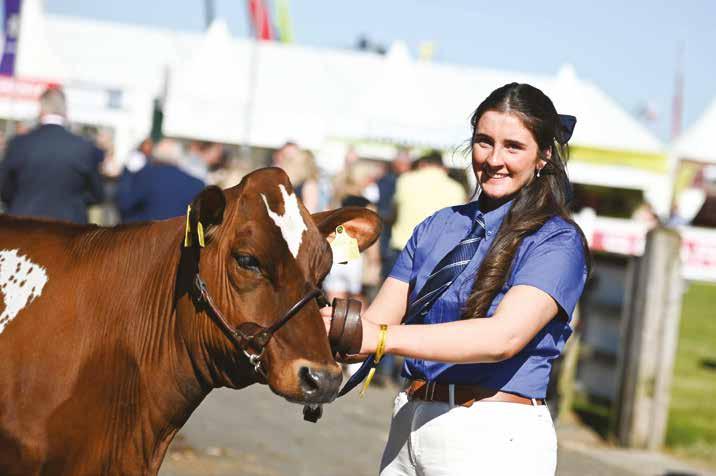
This year’s agricultural shows have all been excellent – much to the credit of show society presidents, chairmen, chief executives and hundreds of volunteers. We have seen plenty of education, livestock and rural community skills, the best of British produce – and much fun being enjoyed by everyone.
We have been to the four corners of the UK. The Balmoral Show was a cracking event with perfect blue sunny skies and good attendance by the public and agricultural community alike. Many congratulations to Royal Ulster Agricultural Society President John Henning OBE and team for delivering in impeccable style the first show of the summer season.
At Balmoral, we were fortunate to secure Minister Andrew Muir MLA as guest speaker. He urged working in partnership to deliver economic and environmental sustainability for the agrifood sector, and the importance of being led by the science and by investing in the technology.
Mr Muir was eager to help farmers mitigate cost and price pressures
by improving their productivity and resilience, while also achieving environment improvement. He was quick to highlight that inconvenient truths made for difficult decisions, and he cited a range of challenges including bovine tuberculosis, inheritance tax, climate change, water quality, nature recovery, ammonia emissions and more.
Mr Muir repeated his opposition to proposed changes to inheritance tax and voiced concern that concessions on agriculture in US trade discussions where cheap imports must not be allowed to undercut quality home produced food provided under the highest welfare standards.
If you haven’t yet joined us at one of this summer’s shows, there is still time to do so.
Joint reception with the Royal Agricultural Society of the Commonwealth on Monday, 21 July. Guest speaker: NFU Cymru Director John Mercer.
WESTMORLAND SHOW
Club reception to be held on Wednesday, 10 September.
Guest Speaker: Robbie Tuer, former Chairman of Cumbria Federation of Young Farmers’ Clubs (Cumbria YFC) and now National Chairman of the YFC Agri Steering Group.
guided masterclass will take you on a tasting journey through the history, styles, and distinctive flavours of Port.
Long associated with festive cheer, each Port will be thoughtfully paired with a bespoke menu specially designed to complement and enhance the tasting experience – a true celebration of craftsmanship and seasonal indulgence ahead of Christmas.
SATURDAY, 6 DECEMBER
A highlight of the Club’s festive calendar and a much-loved tradition for young members and their families.
Step into a world of seasonal magic as we transform the Club into a warm and welcoming Christmas wonderland. Children will delight in a personal visit from Father Christmas himself – with a special gift for every child – and enjoy lively entertainment from our cheeky elf throughout the afternoon.
THURSDAY, 11 DECEMBER
Celebrate the season with fellow Club members at this elegant evening event featuring seasonal dishes, fine wine, and the joyful sound of Christmas carols.
Whether you’re catching up with old friends or making new connections, this is the perfect way to embrace the spirit of the season and round off the year.
ANNUAL DINNER
FRIDAY 12 DECEMBER, 6.45PM
Join us for our inaugural Golf Society Dinner, hosted by captain David Rose.
Our night of fun, frivolity and golfing banter will begin with a drinks reception followed by a three-course festive meal.
Members are encouraged to bring partners and guests and enjoy the company of fellow golfers.
We also encourage you to extend the evening by booking a room for the Saturday night and enjoying London’s Christmas lights and spirit.
Cost: £65pp
BLACK
WEDNESDAY 31 DECEMBER
See in the New Year from out Terrace opposite the London Eye, the focal point for London’s famous firework display.
Entries are open for two initiatives to foster leadership and innovation within the agricultural and food sectors.
Both the Windsor Leadership Trust Bursaries and Snapshot Studies 2025 present unique and transformative opportunities for individuals to develop their expertise, expand their networks and drive change in agriculture.
Windsor bursaries
The FCCT is offering bursaries for individuals in agriculture to participate in one of the Windsor Leadership Trust’s prestigious residential leadership programmes held at Windsor Great Park.
The programme includes insights from leaders across various sectors, including the military, clergy, charities, business and civil service.
Part One lasts two to five days, followed by Part Two up to six months later, allowing participants to reflect and build their skills.
Awardees also gain access to peer-to-peer networking through the FCCT Professional Forums, ensuring ongoing engagement beyond the programme.
Former participant Philippa Wiltshire encourages any would-be


Applications are also open for Snapshot Studies 2025 – offering people in food and agriculture up to £2,000 in funding to turn innovative ideas into impactful projects.
Applicants must submit a oneminute video and brief description of proposal and its potential impact. Each awardee will be assigned a mentor throughout the process.
Studies must be completed by 31 December, with participants presenting findings in a three-
The Windsor leadership programme takes place at Windsor Castle.
Past studies have explored a diverse range of topics, including slow growing broilers in Denmark, mineral supplementation for grazing ruminants, and translating viticulture.
The deadline for both awards is 31 July 2025. To apply for either initiative, please visit www.tfcct.co.uk or scan the QR code here.
Six of the best agricultural educators will receive a share of £25,000 to undertake ground-breaking study tours across Africa and North America.
Funded by The Farmers Club Charitable Trust, recipients will visit farm projects in Botswana, Lesotho, Zambia, Canada and the USA. They will share their findings after returning to the UK. Successful applicants were chosen by a special FCCT selection panel chaired by Tim Jackson, retired principal of
Sparsholt University. Selection panel members included Farmers Club chairman Karen Mercer and FCCT trustees Meryl Ward and Des Lambert.


Recipients include Prysor Williams and Claire Cresswell.
Recipients include Claire Cresswell, of University Centre Sparsholt, who will visit New Zealand to expand her knowledge of sustainable agriculture. Professor Prysor Williams, of Bangor University, will visit the Netherlands to explore innovative ways of strengthening and improving agricultural education. The next round of FCCT awards opens in September. For details, call Lisa Turner on 07879 625660 or visit www.tfcct.co.uk.



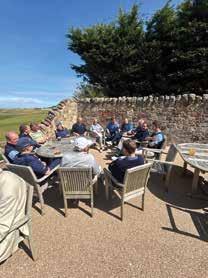
Our new captain looks forward to meeting members, writes
David Rose has taken over the captaincy of the Farmers Club Golf Society and looks forward to meeting as many members as possible during the ongoing season.
Our first match in mid-April versus XL Club was again played at Royal St George's, where we were superbly hosted by David and his team. The course was in great condition despite the dry spring and the rough not too challenging. Congratulations to the XL Club on a comprehensive win.
The black tie dinner on the eve of the match was well attended and enjoyed by all – as was the perfect opportunity to watch Rory McIlroy win the Masters, a nail-biting experience for those fortunate enough to be staying in the Dormy House.
The New Zealand Golf Club in Surrey again hosted our match against the EPICS. A very close match was won 6½/5½ by the EPICS turning round a 3½/2½ Farmers Club lunchtime lead.
Dry weather caused some bare patches on the fairways, but those attending enjoyed wonderful food, hospitality and camaraderie with the opposition.

Our next match was against the NFU on 1 May at Goring & Streatley Golf Club on the Oxfordshire-Berkshire border. A great course in beautiful countryside with lightning quick greens.
As many NFU members were also members of Goring & Streatley, we made this into a three-team match – which was unsurprisingly won by the home team. It was indeed another very enjoyable day.
Our trip to East Lothian is one of the Golf Society's annual highlights. After lunch at Luffness New Golf Club we won our match 4-1 against the New Club. It was a special treat to be able to play fourball betterball matchplay, if only to be responsible for putting your own ball in the numerous bunkers.
The Tuesday evening social at the Old Clubhouse in Gullane was enjoyed by all before a challenging 8.30am start at Muirfield where Gareth Baird hosted our wonderful day at the historic links course. For the first time for many years the Club enjoyed a 5½/4½ victory.
I think our visit is best described by Gareth, who when applying to host next year’s fixture, said: “This year’s match was another huge success with visiting captain David Rose saying it was his best day of golf in 45 years of playing the game.”
Our match versus the BVAGS (postponed from last year) was played at Tadmarton Heath Golf Club near Banbury. A very close 16 a side match was won 4½/3½ by the Vets, the course, new to most of us was challenging mainly due to the dry, bouncy fairways and superb quick greens. All in all, a great day enjoyed by those who attended.
Reports of our next matches and meetings will appear in the next Journal. I must however report great support for the Farmers Club Championship played at Blackwell on 2 July – and thank all new members who are now actively involved with the Golf Society.
Members with suggestions for fixtures and courses to play should please get in touch. New members wishing to play and receive golfrelated updates can also contact Martin Shaw at martin.edwardswale@gmail.com.
July
Tuesday 1st Exclusive Tour of Dovecote Park, which supplies British beef, veal and venison for the retail, fine dining and food service sectors nationwide.
Friday 25th Ceilidh at the Caledonian Club, Belgravia. SELLING FAST, don’t miss out!
August
Saturday 9th Box at Ascot for the Dubai Duty Free Shergar Cup plus evening concert. SOLD OUT.
Sunday 10th Inaugural tennis tournament
September
Friday 26th Jill Willows Training Day at The Farmers Club
Friday 26th Autumn Dinner
Saturday 27th Tour of Lokkelebery Vineyard, the Hertfordshire vineyard established by farmers and growing Pinot Noir, Chardonnay, Pinot Meunier and Pinot Noir Précose grapes. Book Now.
October
Friday 10th Harvest Supper, inter-club event
Saturday 18th – Sunday 19th Farm walk and more weekend in the Cotswolds
November
Friday 28th Festive Dinner. The last dinner of the year – one not to be missed!
Saturday 29th U35s AGM
Saturday 29th Committee Social (Committee members only) In the pipeline
• Polo at Cirencester Park
• Cheltenham races,
• Simulated clay shoot
• Bike rides
• New Holland factory tour
• Social drinks on a Thursday
We are planning an unofficial U35s Ski Trip to take place during the 2025/26 season. If you’d like more details, please contact Ben Barton on 07992 812378.


’m sitting outside writing these jottings in the sunshine. It’s dry and still no rain is forecast. Like most of the country, we could really do with a good soak – the cows and calves included.
I’m pleased to follow my last update with news that we had a very successful calving this spring. The bulls are now back out to work –so we’re already thinking ahead to what next spring might bring.
I’m sure some much-needed rain will come soon. But when it does, it won’t dampen the spirits – or what the U35s have been up to during the last three months, or indeed what’s still to come this year.
We had another successful and fun filled Spring Dinner in April. In total, 64 of our members and guests sat down to enjoy the finest food that the Club has to offer. It really was a successful evening.
Some travelled from as far as Brussels and the Netherlands to attend. Warren Broad gave an excellent and passionate talk on his involvement with DeerBox and the management of wild deer in the UK.
Today I’ve had the final numbers confirmed
supplier Dovecote Park. With our exclusive upcoming visit and tour of Dovecote Park – and the recent UK-US trade deal for beef –the topic couldn’t be more timely.
As of April, the U35s stand strong with 642 members and growing. We now make up more than 12% of the Club’s overall membership. This is an impressive feat and no mean achievement.
We’re always pleased to welcome more U35s members, so if you know someone who might like to join us, please do put them in touch with head of membership Jez Scholfield – his contact details are on page 46.
We held a very worthwhile dinner at the Club for our new members on 23 May. Events like this are sociable and important. It was enjoyed by all, and you could clearly see the start of new friendships forming.
A week later, on 31 May, a group of us met in Richmond Park for the first of what I hope will be many bike rides. We enjoyed a steady ride out to Walton-on-Thames and returned via a non-competitive sprint in Bushy Park… although I think I was fastest.
We finished up in Putney for coffee and some well-earned pastries. Do keep an eye out for our next social ride.
By the time you read this, there will only be two U35s dinners left at The Farmers Club this year. Please make sure you come to one of







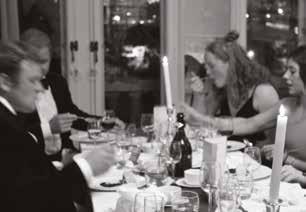
Abrilliant evening full of great food, drinks and good company sums up the U35s Spring Dinner on Friday, 11 April, writes Ed Whattoff.
The Spring Dinner is always a highlight of the calendar, and this year’s event didn’t disappoint. The bar was buzzing throughout the evening and it’s fair to say that the espresso martinis were a big hit.
The night started with a drinks reception, where members caught up over fizz and cocktails, basking in the sun on the terrace. It was the perfect way to ease
into the night and set the tone for what was to come.
As expected, dinner was nothing short of fantastic. Huge thanks to chef Paul Hogben and the kitchen brigade for such a delicious meal. Tables were full of chatter and laughter, with members old and new sharing stories and making connections.
Partway through the evening, U35s chairman Ben Barton welcomed everyone and invited new members to stand and introduce themselves. It was a fun way

to get to know new members – if a little intimidating.
There were also a few fun dinner games throughout to keep the energy up and get people talking, with plenty of laughs all round. Overall, it was a great night and a lovely way to celebrate spring with the U35s community.
We’re already looking forward to the next dinner – and many more events which are planned for the summer and beyond. Here’s to more evenings like this one.




We may be little more than halfway through the year, but we are already planning membership renewals. It would greatly assist the team if all members renewed their subscription by direct debit, as directed in the Club rules & byelaws.
If you don’t already do so, please download a direct debit mandate from our website by using the QR code below or email me to request a form. Otherwise, please complete the form when you are next at reception.
The Club is always at its happiest and most vibrant when members and guests are using the restaurant, bar and function rooms – whether for socialising or for business. I would encourage all members
to make one extra visit to the Club this year. We look forward to welcoming you to your home from home in London.
On growing the Membership, we continue to work tirelessly. Rather than a gradual decline, we are now maintaining steady numbers with 5,036 members as of 1 June. A healthy list of new members is great to see – but we can still do better with your help to grow the membership.
Finally, we would like to sincerely apologise to our valued member Mrs Mary Hay (Lincolnshire) for erroneously including her name in the previous issue’s list of deceased members.
Jez Scholfield, head of membership T: 0207 925 7094
E: hdm&c@thefarmersclub.com

It is with regret that we announce the death of the following members:
Mr Charles Simkins Kent
Mr John Weir London
Dr L O'Connor Surrey
Sir Robert Spencer-Nairn Fife
Dr Michael Anderson-Upcott Sussex
The following new members were elected at April’s Committee meeting:
UK
Ms R Banister Sussex
Mr JT Bebb Shropshire
Mr E Beckett Shropshire
Mr C Behagg Cambridgeshire
Mr GRM Bilton Yorkshire
Mr W Bird Wiltshire
Mr W Black, Stirlingshire
Mr PM Bradshaw Cambridgeshire
Mr AJ Brown Northamptonshire
Mr PA Cramp Yorkshire
Mrs CAS Cundy Shropshire
Mr ER Davies Herefordshire
Mr H Davies Herefordshire
Mrs KA Dibben Dorset
Mrs NR Dobson Shropshire
Mr TP Fraser Suffolk
Mr SJ Gray, Essex
Mr F Harrison Berkshire
Mr DWH Hedges Yorkshire
Mr CJ Horne Worcestershire
Mr DJ Howie Shropshire
Mr RS Jibson Yorkshire
Mr JR Killen Somerset
Mr W King Essex
Mr J Kitson Wiltshire
Mrs VGE Kunzer Essex
Mr RC Laming Lincolnshire
Mr JD Linsell Suffolk
Ms Y Markey London
Mr AN McKirdy Shropshire
Mrs VM Moffitt Northumberland
Mr G Neame Kent
Mr JC Newton Kent
Mr R Owe Shropshire
Mr PD Parton Shropshire
Mr MA Pashley Yorkshire
Mr P Pirie Oxfordshire
Mr SR Povall Shropshire


Mr JE Giles Sussex
Mr JR Goodenough
Miss ML Hudson
Miss AC Hunt
Miss TAM Lang
Miss IF Leverton
Miss E Lewis
Miss A McConnellogue
Hertfordshire
Mr JB Meyer
Mr GAW Parish
Miss PHE Rylatt
Mrs I Trembath
Mr BNB Wallis
Miss IA Walters W
Mrs EL Westerhuis-Wilson
Hertfordshire
Mrs G Westlake
Miss A Winn Northamptonshire

The Worshipful Company of:
Bakers Mr P Baker
Farriers Mr JF Chilman
Woolmen Mr DA Hopkins
Coopers Mr L Johnson
Poulters Mr PA Kelly
Cooks Mr PV Kenyon
Gardeners Mrs C Peck
Fruiterers Mr GE Smith
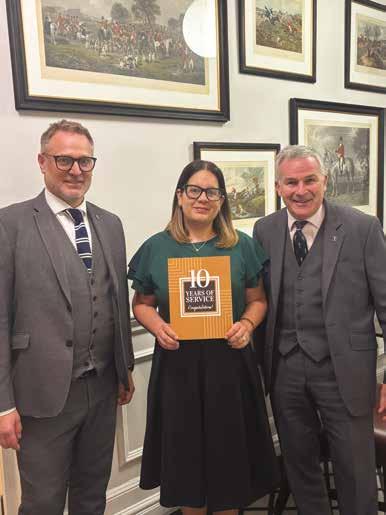

Scan the QR code to renew your membership by direct debit.
Please welcome our new team members – and celebrate our Kusum Saha.
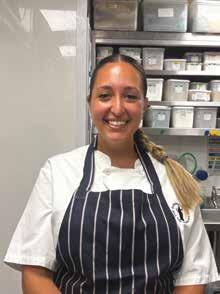
Laura Tonani was professionally trained at the Italian Chef Academy in Rome. She brings a wealth of international experience to our kitchen and we look forward to her tasty treats.
writing and recently worked as a palace guide host at the Kensington Palace. Khia says he is enjoys being at the Club – an organisation he is proud to work for.
Kian Deegan-Smith joined the bar team in April and is fast building on his experience gained working in St Albans. A professional photographer and painter, Kian says he strives for success and enjoys working alongside likeminded team members here at the Club.
Giovanni Camposeo has made a big impact since arriving in the restaurant with his previous experience in some of London's top class London hotels and fine dining restaurants. Giovanni has a family farming background and is passionate about food, wine and basketball.
We offer our gratitude for their service at the Club and extend our good wishes in Rupanjali Bhatia, Kelvin Ramalho, Vanessa Nicholas and Khaled Kouider-Ali
We recently celebrated the remarkable 10-year tenure of Zarreena Dowding as our financial controller. Zarreena is the steadfast pillar of our team at the Club, where she is renowned for her infectious energy and genuine warmth. Zarreena's presence is always uplifting and her laughter resonates throughout the Club. Her compassion and dedication have been equally evident over the past decade. We deeply appreciate the expertise and insight Zarreena brings to our operations
Thank you Zarreena – here's to many more years of collaboration and success.

3 Whitehall Court, London SW1A 2EL
T: +44 (0)20 7930 3557
E: generaloffice@thefarmersclub.com W: www.thefarmersclub.com WiFi Password: MtVH92eE
All categories 900 except the following: Under 35 250
Under 30 (26-29) 150
Under 30 (18-25) 100 Group 375 + VAT
(Members are always responsible for their guests)
Normal Club Dress
After 10am on Monday to Thursday, Gentlemen are to wear a formal jacket and appropriate trousers or suit and tie in all public areas of the Club. Ladies are to comply with the spirit of the code. In exceptionally warm weather, the chief executive and secretary, will allow gentlemen to remove their jackets in the Club.
Smart Casual Dress
Smart casual dress is permitted every morning, Monday to Thursday inclusive until 10am and all day on Friday, Saturday and Sunday. Smart casual dress applies throughout August. Smart Casual Dress allows members to wear long or short-sleeved full buttonfronted shirts or smart polo shirts, smart denim jeans and ‘fashion’ pumps. Smart trainers are acceptable, however, not encouraged.
Unacceptable Clothes
This includes torn, frayed, faded or bleached clothing of any type, sportswear, shorts, T-shirts, leggings and jogging suits in any material, bare midriffs or excessively revealing clothing, and plastic flip flops.
Meetings & Functions
Those members and guests attending a meeting or function that has been booked with the Club Management in any of the function rooms are requested to wear a shirt with collar and a jacket (or equivalent for ladies), a tie is preferred but optional. If members and guests utilise the bar facilities, dining room, lounge or Shaw Room they are expected to adhere to the Normal Dress code (above).
Bedroom rates for 2025. Please see the website for rates. Members can book on-line at: www.thefarmersclub.com/accommodation
Reservations
Bedrooms may be booked up to a year in advance. For those who register via the website, you can book on-line. Specific room numbers can be requested however we are unable to guarantee these requests. There are no emergency bedrooms.
Check in is 1400hrs and departure time is 1100hrs. At weekends please check in between 1400hrs & 1530hrs before reception closes at 1600hrs.
Cancellations
Members over 65 and with 20 years’ membership are entitled to a reduction to their subscription. Log into the Members Area to renew your membership details and to pay online. For membership applications, please contact Jez Scholfield at hdm&c@thefarmersclub.com
Confirmation of cancellations must be made in writing. Please note that the full room rate will be charged in the event of a cancellation being made less than 48 hours prior to arrival unless the room is re-let.
Luggage Room
This is a short-term storage facility only. In the event that luggage has been left for a period of over 3 months and we are unable to identify the owner, it will be disposed of.
Smoking & Vaping
Smoking and vaping is not allowed within the Club, but is allowed on the terrace.
Function Rooms & Events
If you are looking to book a business meeting or social event here at the Club, please contact our conference and banqueting sales manager on 020 7925 7100 or functions@thefarmersclub.com, who will be delighted to assist.
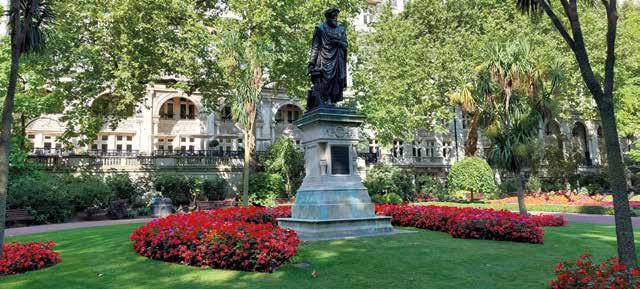
The Shaw Room (Library): The Shaw Room can be used for informal meetings of up to three people, however the door must be kept open for other members to use the room. Electronic devices may be used but must be set to silent. No calls can be received or made in this area. Calls can be made on the nearby terrace.
Business Suite: The suite is for individual private working. Meetings are prohibited. Electronic devices can be used; however, other members must be respected. Printers are available on a reasonable use basis.
Electronic Devices
No electronic devices are to be used in the hallways, bar, lounge or restaurant – unless for the purpose of quiet reading. No calls must be received nor made in these areas. Calls may be taken on the terrace.
The Club has reciprocal arrangements with the following clubs. Members wishing to use the facilities of the named clubs must obtain an introductory card from the General Office (generaloffice@thefarmersclub. com) prior to their visit.
UK: City Livery Club, London (No beds); Bury St Edmunds & Farmers Club (No beds); Northern Counties Club; The New Club, Edinburgh; The Royal Scots Club, Edinburgh. Ireland: The Royal Dublin Society, Dublin (No beds); Stephen’s Green Club, Dublin. Africa: The Muthaiga Club, Kenya (temporary membership payable); The Rand Club, Johannesburgh. Australia: The Queensland Club, Brisbane; The Australian Club, Melbourne; The Geelong Club, Victoria.
New Zealand: The Canterbury Club, Christchurch; The Christchurch Club, Christchurch.
HONORARY VICE PRESIDENTS
Barclay Forrest OBE
Sir Mark Hudson KCVO
Paul Heygate OBE
THE COMMITTEE OF MANAGEMENT OF THE CLUB 2025
VICE PRESIDENTS
Nicki Quayle
Julian Sayers MBE DL
PRESIDENT AND CHAIRMAN
Karen Mercer
TRUSTEES
Tim Bennett (Chairman)
John Lee OBE DL
Jimmy McLean
Keith Redpath
VICE-CHAIRMAN
Christopher Riddle
HONORARY TREASURER
John Hardman
IMMEDIATE PAST CHAIRMAN
Richard Maunder
CHIEF EXECUTIVE & CLUB SECRETARY
Didi Wheeler
CLUB CHAPLAIN
The Reverend Dr Sam Wells
Elected 2022 to serve from 2023 to 2025 inclusive: Sue Bullock (re-elected), Sarah Cowlrick (re-elected), Sophie Dwerryhouse, Nick Green (co-opted), Lindsay Hargreaves, John Wilson
Elected 2023 to serve from 2024 to 2026 inclusive: John Henning OBE, Peter Jackson, Anthony Snell (re-elected), Bill Young
Elected 2024 to serve from 2025 to 2027 inclusive: Edward Barker, Stephen Butler (re-elected), Belinda Gladwin, Tory Manuel, Tric Parrott
Co-opted: Nick Green (chairman, FCCT), Ben Barton (chairman Under 35s), Harriet Sylvester (vice chair Under 35s), Ed Whattoff (Under 35s)
THE FARMERS CLUB CHARITABLE TRUST TRUSTEES
Nick Green (chairman), Theresa Howe, Des Lambert OBE, Dr Jenna Ross OBE, James Squier, Christine Tacon CBE, Meryl Ward MBE, The Chairman and Vice-Chairman of The Club (ex officio). Patron Mrs Stella Muddiman
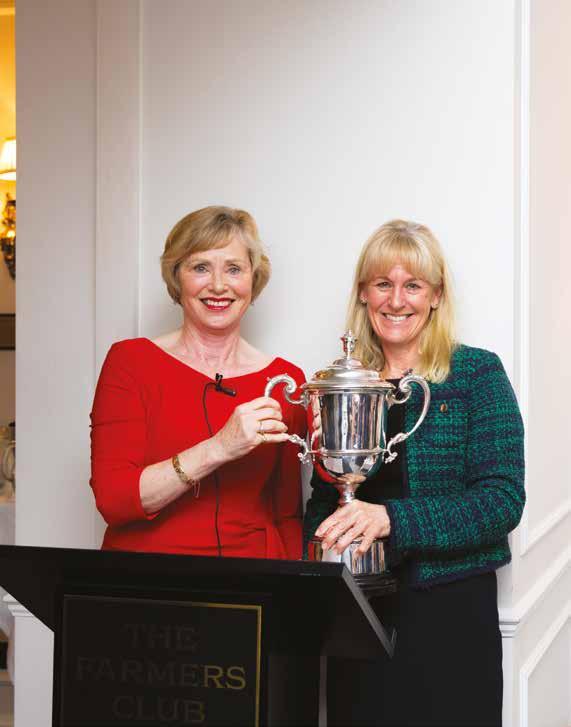
Farmer and former NFU president Baroness Minette Batters was awarded the Farmers Club Cup for 2025 at a special presentation on St George’s Day.
Awarded almost every year since 1957, the Farmers Club Cup recognises individuals who have made a significant and long-lasting contribution to farming. Recipients are nominated by the Farmers Club Chairman and supported by the Club’s General Committee.
Presenting Baroness Batters with the cup for 2025, Club Chairman Karen Mercer said: “I would like to make the most of this opportunity to acknowledge and give you just a glimpse of all that Minette has done for agriculture.”
Minette joining the NFU when she started farming in 1998, when her father retired, taking on the tenancy of a 300-acre mixed farm near Downton in Wiltshire. The business includes a 100-cow continental cross suckler herd, as well as sheep and arable.
Alongside the farm, Minette runs numerous diversified enterprises. These comprise horse
liveries, a catering business and a 17th Century barn which has been converted into a wedding and events venue.
After serving as county chair for Wiltshire and on several NFU committees, Minette served as NFU deputy president for four years from 2014 before being elected NFU president in 2018, serving three terms – a total of six years.
As NFU president, Minette worked with four prime ministers and six Defra secretaries. All of them without exception, said Karen, were left “in no doubt, about her strength of character and her determination” during a time of huge change.
Minette’s time as a senior NFU officeholder encompassed Brexit, the Covid pandemic and Russia’s invasion of Ukraine – all events which have had a direct and ongoing impact on UK growers and livestock producers.
In 2020, she was part of a campaign to ensure that post-Brexit agricultural trade agreements, such as those with the USA, do not allow the import of food produced under conditions which would be illegal in the UK.
Farmers have also had to contend with unsustainably high production costs, increasingly unpredictable weather – including periods of drought and flood leading to crop and livestock losses – and huge uncertainty due to changes in government policy.
Karen said: “I would like to thank Minette for all she did for agriculture and the British farmer, during her tenure at the NFU, and to warmly congratulate her on the honour that has been bestowed on her.”
Minette was made a Deputy Lieutenant to Her Majesty Queen Elizabeth in 2021.After standing down as NFU president in February 2024, she was appointed as a crossbench member of the House of Lords.
Earlier this year, Defra secretary Steve Reed appointed Minette to lead a review of farm profitability. In this role, she will make recommendations to support farming profitability as part of the government’s New Deal for Farmers.
Karen said: “We know that you will do your best to ensure that our farmers are treated fairly and receive the correct financially reward for the goods that they produce. It is not going to be easy task – we certainly wish you well. Good luck.”
Pictured: Baroness Minette Batters (right) receives the prestigious Farmers Club Cup for 2025 from Farmers Club Chairman Karen Mercer.


